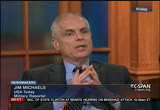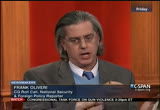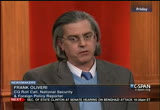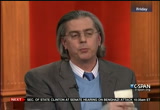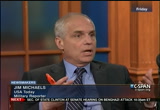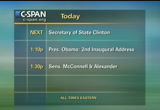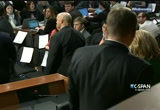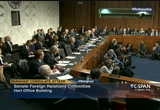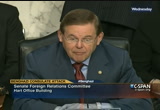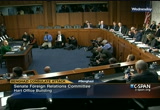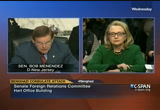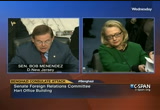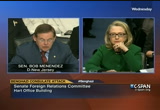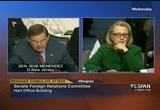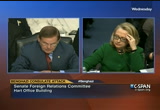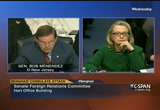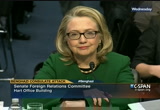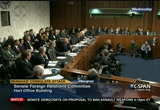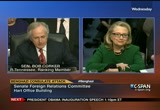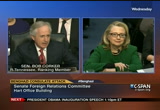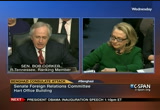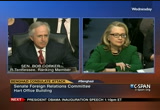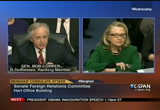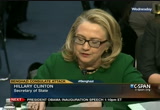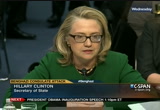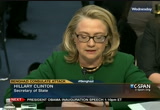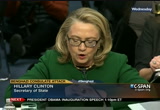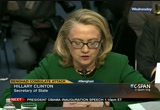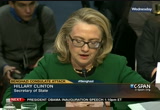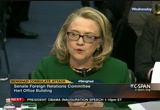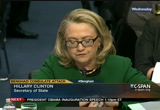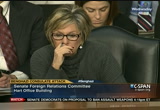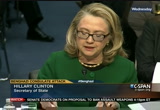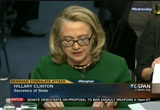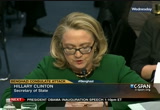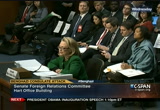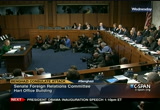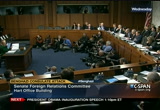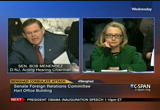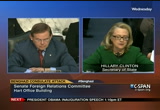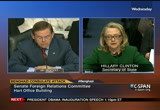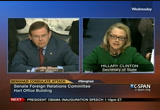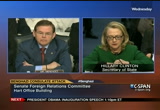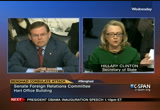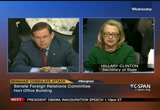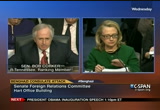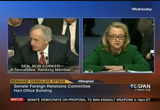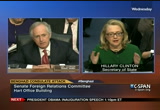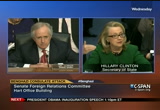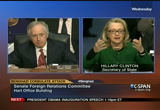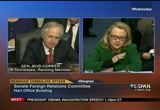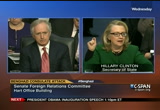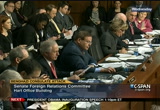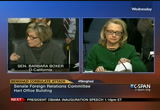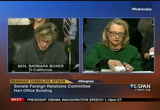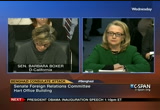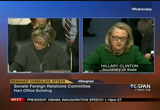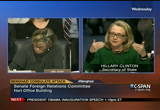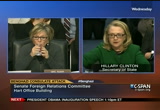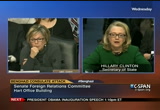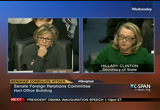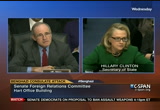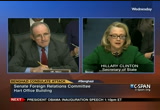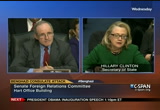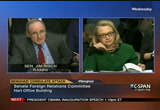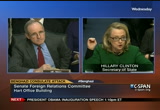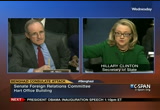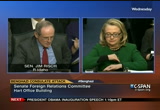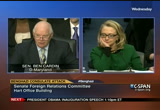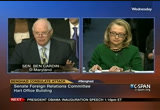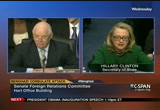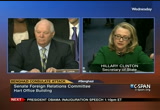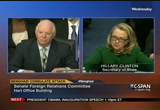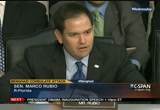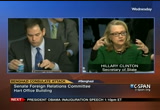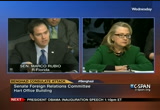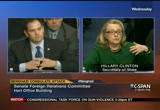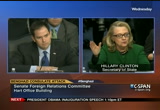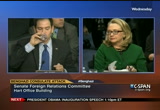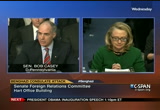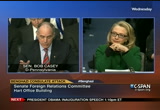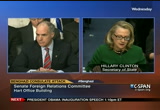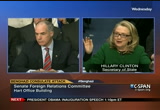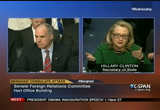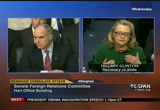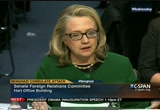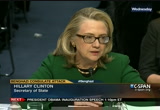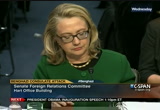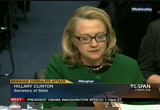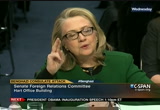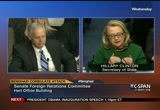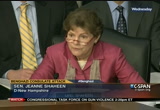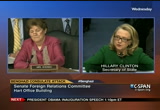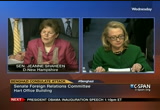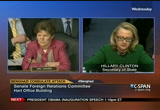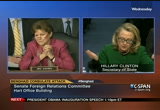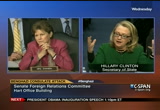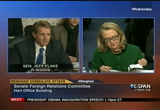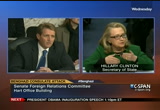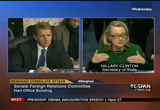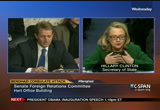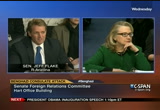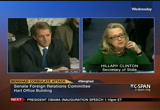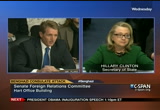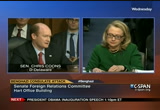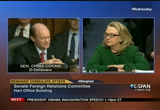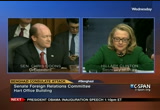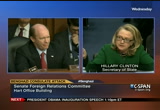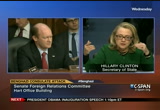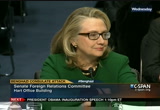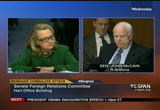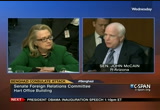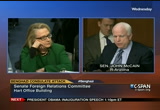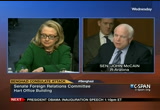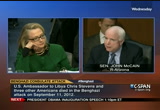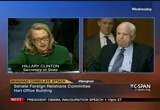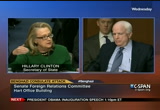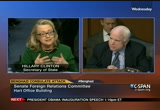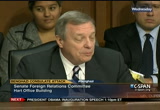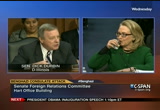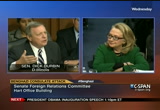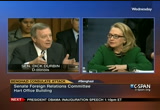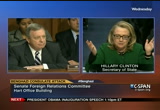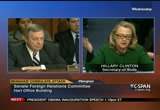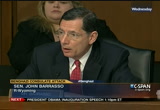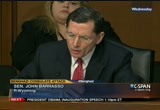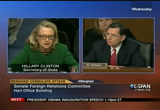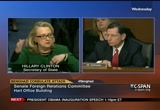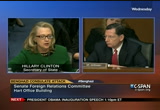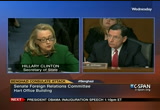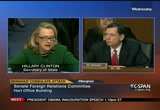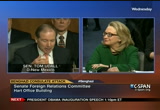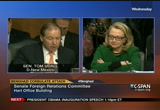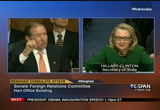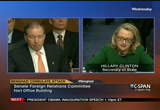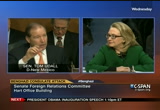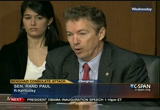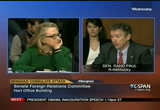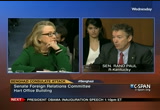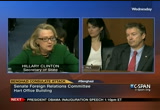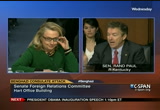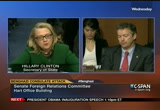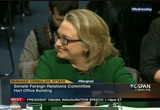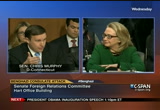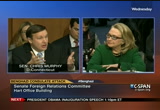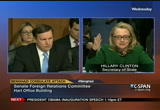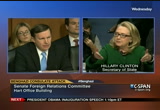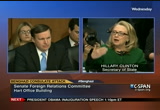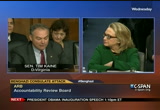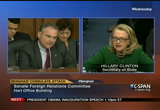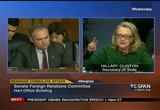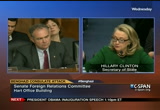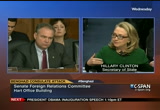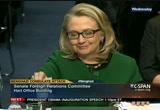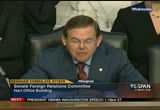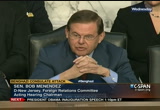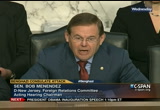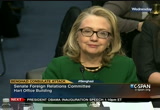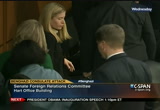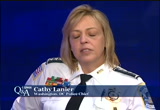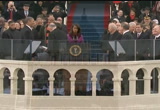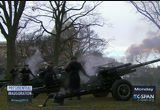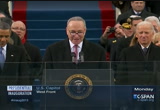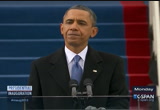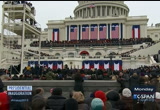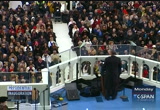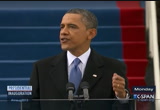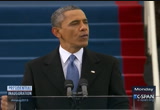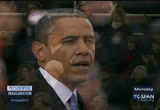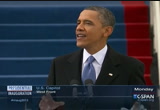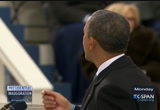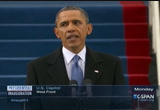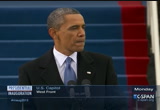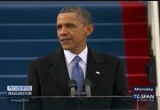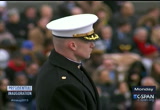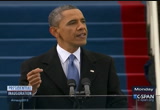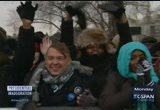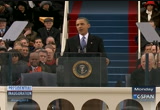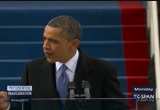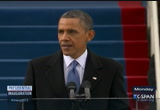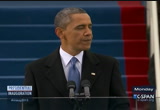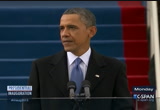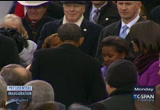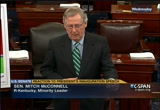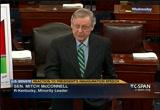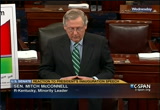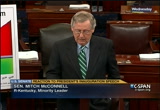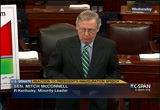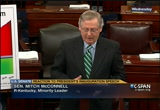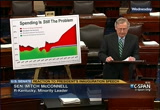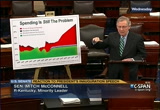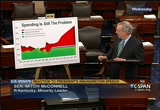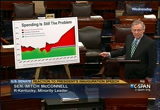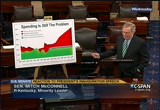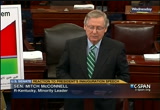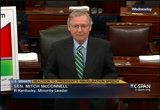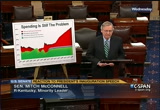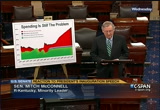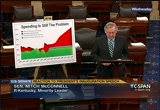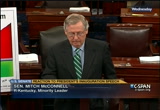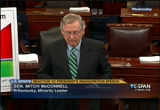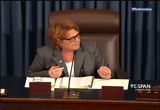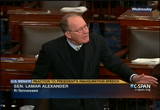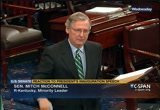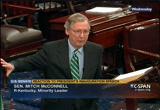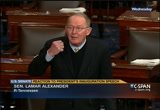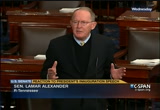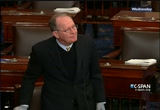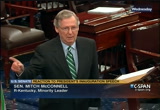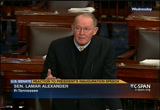tv Washington This Week CSPAN January 27, 2013 10:30am-2:00pm EST
10:30 am
arms. the center suggested that he was not comfortable with moving entirely in that direction. i think the signing of the regulation was the easy part. we got a taste of this today. >> it is interesting. this is a democratically controlled senate. while the senator may object to propose legislation, harry reid controls the floor. carl levin to support the president also is the chairman of the senate armed services committee. myofempact senator c-span.or have, you have john mccain saying this is a good idea.
10:31 am
do not lower the standards. >> eden not get an answer to your specific question on the sequestration. you as whether or not there any force is coming into play. do you have a sense that sequestration is likely to have been? >> senator durban, and the number two debbie 0 democrat in the senate has just appointed that he is becoming the top defense appropriators. he had said very recently that he did not think sequester would be averted. it does not look currently where these parties are that they are close to any kind of a deal. they may try to find a way to
10:32 am
kick the can down the road where they bought themselves 60 days. it does not look particularly good right now. very few people seem to be confronting that. it shall take a lot to pull this off. >> the pentagon has started to take steps to prepare itself for the sequestration and planning that has not taken place until now. >> they are laying off temporary employees. it is starting to happen. >> senator inhofe has been critical about not planning earlier. the >> there is a little brinkmanship going. i do believe there was a time and when each everybody said we are all against it so how can have them? there never was a path that the two sides could find that would
10:33 am
lead them to averting it. >> the center was critical of the president in the stance of his overall military and mention three ways the president has worked for cuts, and delays, and additions to the military budget. when you talk to officers of line, and you find them as critical of the administration that what is: on average is very dramatic. this represents a huge threat to the united states. there are others that would argue it is more a regional. the ability to react is clearly
10:34 am
limited. when you look at individual things, there are concernes. afghanistan is another issue. >> watched "newsmakers" with senator james inhofe today at 6:00 p.m. eastern. next on c-span, secretary of state hillary clinton on the benghazi attack in president obama's second inaugural address followed by reaction to president obama's speech from
10:35 am
mitch mcconnell and lamar alexander. now testimony from hillary clinton on the attack on the u.s. consulate in benghazi. secretary clinton took responsibility for the deaths of four americans including ambassador chris stevens. this is one of her last hearings before she steps down. john kerry is the nomination to replace her. from the foreign relations committee, this is to 0.5 hours. -- 2.5 hours.
10:36 am
10:37 am
let me welcome me and thank you for honoring your commitment to come before the committee after the review board's findings. you said you would after the findings were completed. you have a bit of an intervening challenge. we are thrilled to see you here today doing well. and to take time out of your schedule to discuss the tragic events from the causing -- from benghazi to learn. in your tenure as secretary, you've always been up front and energetic and defending our foreign service officer and their needs. i commend you for it. the tragic event in benghazi are
10:38 am
a sad reminder of the risks that come with diplomatic engagement and parts of the world but are struggling to build new governments. it underscores the real courage of the unsung women who put their lives at risk. i respect what you have done. this is a reflection of your leadership as well as your patriotism. your candor has been a trademark of your service as secretary of state. i believe every member has welcomed your openness and cooperation. your letter of december 18 was appreciated by members of both
10:39 am
sides as another example of the openness. we share your mission here today. we look forward to a constructive dialogue to learn from the events that occurred in benghazi and to design policies that better protect the women serving in d.c. they lost their lives on september 11, 2012 during terrorist attacks on a special mission. we honor their service to our nation. we grieve with their families. the result to take specific actions to prevent future incidents as. we not be able to prevent every single attack in the future. we must make sure our employees are capable of standing up such an attack.
10:40 am
they have embraced this. we will hear more of the progress they have made on the implementation of many of the recommendations. i would add that congress is not without responsibility. we have an obligation to do our part to comply. it is my ability to better protect our employees. when it the easiest things we can do is to ensure that the contrasting roles allow for sufficient flexibility where the on aity is at risk and best value basis to ensure we're not just attacking this, this
10:41 am
has a 3 march. by you should be a priority in all locations. we're looking at where sole source contacting me be appropriate. we also support expanding the marine security guard program, hiring more diplomatic security personnel and authorizing full funding for the embassy construction, capital costs program. the program was created in the aftermath of the 1988 bombing that resulted in 224 deaths, including a 1100 american citizens. it funded the construction of 13 new facilities in the first year, followed by 11 in 2006. nearly every year since, fewer have been built than the previously year due to funding constraints.
10:42 am
at the current anticipated funding rate for fiscal year 2013, we will be able to construct just three new facilities, despite the fact there are a couple dozen posts designated as high-risk, high threat posts. the lessons of benghazi are not only about adequate security operations. it is also our foreign at facilities, within the department itself, and between the department and congress. the department should be assessing and regularly designating which post is high
10:43 am
threat or high risk. using that information to drive decisions about security. the administrative review board also made clear they were failures in benghazi that resulted in inadequacy, and the responsibility is shared by washington, and by the inexact status. it is left unclear what the security was or should be. clearly, that needs to change. there are two other crucial points made that deserve attention on a larger scale. first, the emphasis on the growing challenge faced by all american officials operating overseas, how to remain active in high threat environment. how to get out beyond the walls of our facilities. how do we remain successful in the private sector while still securing our embassies and protecting our people in these environments?
10:44 am
the review board correctly points out the department has been resource-challenged for many years. this has constrained our mission, and restricting the use of resources even for security has become a conditioned response. decisions about the security resources being made more on costs than value. the approach fails to recognize the diplomacy and foreign aid put down payments in terms of good will, open borders for the export of american products, protection of intellectual property, and, most importantly, cooperation on security and counterterrorism. there is a lot to discuss. welcome again. we appreciate your time. on a personal note, since this is likely to be your last hearing before this committee and your leadership will be
10:45 am
missed, i speak for many when i say you have been an outstanding secretary of state. you have changed the face of america abroad, and extended the hospitable reach of our nation to ordinary citizens in addition to world leaders. during your tenure, changes in asia, a momentous transition in libya, and a trend toward global strength based on economics rather than arms. i personally appreciate the fact you use your office to aggressively find sections to iran. you supported the voice of those individuals who do not live in the limelight, women, children, religious minorities, and the lgbt community. i look forward to working closely with you in the future.
10:46 am
we thank you for your service here in the senate. as secretary of state, we welcome you back any time to talk about the issues of the day, recognizing you may not care to spend more time in that chair then you already have. we appreciate your incredible service. let me turn to my friend and colleague, the new ranking member of the committee. >> thank you. thank you for your comments. and also for following through to have this hearing today. i want to welcome the new committee members. there will be time for us to talk a little bit about the
10:47 am
committee moving forward in many ways. this is closing out business from before. i thank you very much for having this hearing. i want to thank you, also. we have had a number of conversations over the last several weeks and the last four years. i want to thank you for coming in today and honoring the commitment you made some time ago. i know you have had health issues still undergoing and you are hill -- you are here today. we do respect the tremendous amount of hard work you put forth over the last four years. you trot -- you probably traveled more than any secretary of state in history. you can add your job with hard work and diligence. we all appreciate the transparency with which you talk to all of us. i do want to say benghazi represents a lot of different things. in some ways, the aftermath in
10:48 am
particular of what we saw represents the very worst of washington. the most bizarre briefing i think i ever attended was on september 20, where the intelligence community said more than nothing and it was a bizarre briefing, at best. happened in the middle of a political campaign and there was a lot of spin from the white house and a lot of comments made on both sides of the aisle, which heightened a lot of the focus on benghazi. i think it also represented a department that made decisions that were not based on what was best for those in the field. i think it represented in many ways the denial of the world as it really is today. after reading the arb, it represented a committee that
10:49 am
has never done its work, never done the kind of oversight this committee ought to do. it also represents an awakening. i know you have known this, and especially many of the members on this committee have known this. the spiking of the ball and thinking when osama bin laden was gone, that was the end of al qaeda, we know nothing could be further from the truth. the arab spring is ushered in a time where al qaeda is on the rise. the world, in many ways, is even more dangerous as we lack a central command and instead have these nodes scattered throughout north africa and other places. this creates an opportunity for us to address the world as it really is today. thirdly, i know it was a great
10:50 am
personal loss to you that chris stevens died in the way he did and his three colleagues died the way they did. i know you have experienced this and some other members have, but look at the faces of those on the ground in libya in a state of shock, people we send there, doing expeditionary diplomacy, who felt they were on a tether and did not have the support from washington they needed, to do the things they needed to do. i think this is an opportunity for us to examine the failures. i know you will be as transparent as you have always been. this is a great opportunity for the incoming secretary to learn from what has happened. many times, political appointees have great difficulties with the bureaucracy that exists
10:51 am
within a the department where people think they can wait you out. this is an opportunity for us also to develop a foreign policy that reflects, again, the dynamics of the region as they really are today. lastly, i think this is an opportunity for the committee to finally do the work that it should have been doing for years. when you read the record and realize we have never done an authorization of the state department in the six years i have been here, we have never looked at how foreign aid has been spent. we have never done a top to bottom review. it is something people like you come to this position, look at as something that is healthy. there was mention of cost. i was disappointed with the arb when the first thing that came out of the mouths of people i respect was money, money, money.
10:52 am
this committee would have no idea whether the appropriate amount of money is being spent or if that could have prevented what was happening -- what happened because we have never had an authorization. i want to close again by thanking you for your service, thanking you for your friendship, thanking you for your transparency, and i certainly look forward to your testimony. i know it will be presented in a way that will be constructive and helpful for us in the future. >> thank you. we welcome your remarks. >> thank you. members of the committee, older and new, i am grateful for the opportunity and thank you for your patience. as both the chairman and the ranking member have said, the terrorist attacks in benghazi in 2012 that claimed the lives of four brave americans, chris stevens, glen doherty, sean
10:53 am
smith, and tyrone woods, are part of a broader strategic challenge to the united states and our partners in north africa. i want to offer context, share what we have learned, and where we can work together to not only honor our fallen colleagues, but continue to champion american interests and values. any clear-eyed examination of this matter must begin with a sobering fact. since 1988, there have been 19 review boards investigating
10:54 am
attacks on american diplomats and their facilities. benghazi joins a long list of tragedies for our department, other agencies, and america. our embassy in 1983, counsel and staff murdered in 2004, the coast attack in 2009, and too many others. since 1977, 65 american diplomatic personnel have been killed by terrorists. the list of lives saved is even longer. we should never forget our security professionals get it right more than 99% of the time against difficult odds all over the world. that is why, like my
10:55 am
predecessors, i trust them with my life. administrations of both parties and partnerships with congress have made good faith efforts to learn from these attacks. to implement recommendations from the review boards, to seek the necessary resources, and to do better to protect people from constantly evolving threats. that is the least the men and women who served this country deserve. i have no higher priority and no greater responsibility. as i have said many times, i take responsibility and nobody is more committed to getting this right. i am determined to leave our country safer, stronger, and more secure. taking responsibility meant moving quickly in those first uncertain hours and days to respond to crisis, but also to further protect our people in high threat areas across the world.
10:56 am
it meant launching an independent investigation to determine exactly what happened in benghazi and recommend steps for improvement, and it meant intensifying efforts to combat terrorism and figure out effective ways to support the emerging democracies. let me share some of the lessons we have learned, the steps we have taken, and what we continue to do. let's start on september 11 and those difficult early days. i have stayed in close contact with officials across our government and the libyan government. i saw firsthand what is called timely and exceptional coordination. no delays in decision making. no denials of support from washington or our military. i want to echo the review board's praise for the valor and courage of the people on the ground, especially the security
10:57 am
professionals in benghazi and tripoli. american lives were saved in real time. the next morning, i told the american people that heavily armed militants assaulted our compand. i vowed to bring them to justice. i stood with president obama as he spoke about an act of terror. it is important to recall in that same time period, we were seeing violent attacks in cairo, as well as large protests outside many other posts, where thousands of our diplomats served. so i immediately ordered a review of our security posture around the world, with particular scrutiny for high- threat posts. and i asked the department of defense to join interagency security assessment teams and to dispatch hundreds of additional marine security guards. i named the first deputy assistant secretary of state
10:58 am
for high threat posts so missions in dangerous places get the attention they need. and we reached out to congress to help address physical vulnerabilities, including risks from fire, and to hire additional diplomatic security personnel and marine security guards. second, even as we took these steps, i hurried to appoint the accountability review board so we could understand what was wrong, how do we fix it. i have accepted every one of their recommendations. i asked our deputy secretary for management and resources, deputy tom nides, who appeared before this committee last month, is leading a task force
10:59 am
to ensure all 29 are implemented quickly and completely, as well as pursuing additional steps above and beyond the recommendations. i pledged in my letter to you last month that implementation would begin and it has. 85% are on track to be completed by the end of march, with a number completed already. but we are also taking a top-to- bottom look to rethink how we make decisions on where, when and whether our people should operate in high-threat areas, and how we respond to threats and crises. we are initiating an annual high threat post review chaired by the secretary of state, and ongoing reviews by the deputy secretaries, to ensure that pivotal questions about security reach the highest levels. we will regularize protocols for sharing information with congress. these are designed to prevent another attack.
11:00 am
we are also moving on a third front, addressing the broader strategic challenge in north africa and the wider region. benghazi did not happen in a vacuum. the arab revolutions have scrambled power dynamics and shattered security forces across the region. instability in mali has created an expanding safe haven for terrorists who look to extend their influence and plot further attacks of the kind we just saw last week in algeria. and let me offer our deepest condolences to the families ofwe remain in close touch with the government of algeria, ready to provide assistance if needed, and also seeking to gain a fuller understanding of what took place so we can work together to prevent such terrorist attacks in the future. concerns about terrorism and instability in north africa are not new, of course. they have been a top priority for this entire national are not new, of course. they have been a top priority for this entire national security team. but we need to work to increase
11:01 am
pressure on al-qaida in the islamic maghreb and the other terrorist groups in the region. i've conferred with the president of libya, the foreign ministers and prime ministers of tunisia and morocco. i met with a very large group of regional leaders at the un and was part of a special meeting focused on mali and the sahel. in october, i flew to algeria to discuss the fight against aqim. in november, i sent deputy secretary bill burns on an interagency group to algiers to continue that conversation. and then in my stead, he co- chaired the global counterterrorism forum that was held in abu dhabi and a meeting in tunis of leaders working on
11:02 am
building new democracies and reforming security services. closing safe havens, cutting off finances, countering their extremist ideology, slowing the flow of new recruits. we continue to hunt the terrorists responsible for the attacks in benghazi and are determined to bring them to justice. we are using our diplomatic and economic tools to support the emerging democracies and strengthen to provide a path away from extremism. the united states must continue to lead in the middle east, in north africa, and around the world. we've come a long way in the past four years, and we cannot afford to retreat now. when america is absent, especially from unstable environments, there are consequences. extremism takes root. our interests suffer. our security at home is threatened. that's why chris stevens went to benghazi in the first place. nobody knew the dangers better than chris.
11:03 am
a weak libyan government, marauding militias, even terrorist groups; a bomb exploded in the parking lot of his hotel. he never wavered. our men and women who serve overseas understand that we do accept a level of risk to represent and protect the country we love. they represent the best traditions of a bold and generous nation. they cannot work in bunkers and do their jobs. but it is our responsibility to make sure they have the resources they need to do those jobs and to do everything we can to reduce the risks they face. for me, this is not just a matter of policy. it's personal. i put my arms around the mothers and fathers, the sisters
11:04 am
and brothers, and the wives left alone to raise their children. it has been a great honor to lead the men and women of the state department and usaid, nearly 70,000 serving here in washington and at more than 275 posts around the world. they get up and go to work every day, often in difficult and dangerous circumstances because they believe the united states is the most extraordinary force for peace and progress the earth has ever known. and when we suffer tragedies overseas, the number of americans applying to the foreign service actually increases. that tells us everything we need to know about what kind of patriots i'm talking about. they do ask what they can do
11:05 am
for their country, and america is stronger for it. so today, after four years in this job, traveling nearly a million miles and visiting 112 countries, my faith in our country and our future is stronger than ever. every time that blue and white airplane carrying the words "united states of america" touches down in some far-off capital, i feel again the honor it is to represent the world's indispensible nation. and i am confident that, with your help, we will keep the united states safe, strong, and exceptional. so i want to thank this committee for your partnership and support. you know that america's values and vital national security interests are at stake. it is absolutely critical that this committee and the state department work together with
11:06 am
your new secretary of state to address the changes needed to face our increasingly complex threats. i know you share my sense of responsibility and urgency and while we may not agree on everything, let's stay focused on what really matters -- protecting our people and the country we love. thank you for the support you personally have given to me over the last four years. i would be happy to take your questions. >> thank you. we have a full committee present. in order to give each member an opportunity to give everyone time, i will limit those to five questions. i start with myself. we saw a late night reporting on discussions of a location of the benghazi.
11:07 am
my understanding is that the location was an ongoing one and that the ultimate conclusion of the ambassador stevens is that we need to be in the benghazi and that, while he was continuously reviewing other options, it was his conclusion, as well as that of the security personnel that the current site was the best choice, despite a higher price tag because it was more secure than returning to the hotel, where there had been a bomb and bomb threats or moving closer to the and that's because it was closer to the road. can you give us your insight on the decision making process regarding the location of the mission?
11:08 am
can you -- you touched upon it in your ultimate the statement, but what actions were you and your staff taking that night? >> first, you are right there was an ongoing discussion. when chris first landed in benghazi, he stayed in a hotel. there were attacks in the vicinity, including in the parking lot of the hotel. the decision was to move. the compound was selected as being a much better location in terms of security than the alternative. there was an ongoing discussion between tourists and others and those going in and out of benghazi about how best to situate our post there. i saw overnight reporting about a document. i am not sure what it is. i would observe there were a lot of ongoing efforts because
11:09 am
it was important we were constantly asking what was the best place. as you said, and chris was committed to not only being in the benghazi but to the location. the professionals in washington paid close attention to his judgment based on his experience and firsthand knowledge. we stayed and continued to try to upgrade the facility that was attacked. as has been pointed out, there were inadequacies in the response. specific kinds of recommendations we are currently implementing. regarding what i was doing on september 11, i was at the state department all day and late into the night. during most of the day, prior to getting notice of the attack,
11:10 am
we were focused on our embassy in cairo. that was under assault by a group of protesters. we were assessing the security of our embassy, which is well- defensed. there were crowds intent on trying to scale a wall. we were in close communication with our team. i was notified of the attack for the after 4:00 p.m. over the following hours, we were in continuous meetings and conversations in the department with our team in tripoli, in the agency, and internationally. i instructed officials to consider every option, to break
11:11 am
down the doors of the libyan officials to get as much security support as we possibly could to coordinate with them. i spoke to the national security adviser several times. i briefed him on developments. i sought all possible support from the white house. they quickly provided it. tom was my first call. i spoke to get the situation updates. i spoke with the former cia director to confer and coordinate, given the presence of his facility, which was not well known, but was something we knew and wanted to make sure we were closely last up together. i talked with the libyan national congress president to press him on greater support. i participated in a video
11:12 am
conference senior officials. we were going over every possible option, reviewing all that was available to us. any actions we could take. we were reaching out to everyone we could find to get an update about ambassador chris stevens, and also our information specialist, john smith. -- sean smith. i spoke with president obama later in the evening to bring
11:13 am
him up to date, hear his perspective. we kept talking with everyone during the night, in the morning, on the 12th, i spoke with jim -- general dempsey. the two hardest calls i made to -- were obviously to the families. they were extraordinary in their responses and their understanding of the pride we had in both men. and gratitude we had for their service. i would add, mr. chairman, that while this was going on and we were trying to understand it, get on top of it, we were continuing to face protests, demonstrations, violence across the region. there were so many protests happening and fat -- and thousands of people were putting our facilities at risk. we were certainly very determined to do whatever we could about benghazi. we were really -- relieved when we got the last americans out.
11:14 am
>> thank you. my time is expired. >> thank you. madam secretary, i agree with you when people go in the field, they do it knowing the risk. one of the untold stories here is the heroic capture nature of what they did to save lives in libya. i also have to say there were systemic deficiencies and i know you know that. i would like to speak to that for a moment. to my knowledge, no one has been held accountable. our staff had a meeting with one of the state department officials.
11:15 am
it was nothing short of bizarre as they talked about the communications. these officials were screaming out for more security. i am wondering if you might mention one reform that might be helpful so you would have known of the need their of security -- there of security. >> i have thought about this almost constantly since that date.
11:16 am
i do feel responsible. i feel responsible for the nearly 70,000 people who work for the state department. i take it very seriously. the specific security request pertaining to benghazi were handled by the security professionals in the department. i did not deny them or approve them. that is one of the findings that the ambassador and the admiral made that these requests do not ordinarily come to the secretary of state. >> i respect you tremendously but we have a short amount of time. they did come into focus. we did have people on the ground at no cost to the state department. they were asked to be extended by the ambassador. someone at the state department turned that down. i just wonder what has happened inside to make sure that never happens again. >> several things. not only are we on the path to implement all of the recommendations. we have gone beyond that. we immediately did this high threat assessment using these assets as well as our own. that had never been done before. we asked congress to help us reallocate funds. the senate has given us that authority. we do not yet have it from the house. we can get more marine guards, a more security guards, put
11:17 am
more money in the maintenance and the construction needed. i am recommending there be a regular process that includes the secretary and the deputies in these decisions. nobody wants to sit where i am and have to think now what could have, should have, would have happened to avoid this. only two have ever been unclassified. the one coming out of the east african bombings, where there was full transparency, a set of recommendations, many of which have been abandoned. this committee never had a public hearing about the 17 others, because they were classified. we are putting into action
11:18 am
steps that we think will help the next secretary be able to make these decisions, be part of these decisions, have more insight into what is going on, and we would welcome the opportunity to work closely with a subcommittee or a set of members to make sure that is what is happening. >> thank you. i will say none of them have ever been fully implemented. >> that is not accurate. i heard you say that and it shocked me. we went back and did a full and thorough investigation. the vast majority have been implemented. we will give you a report to that effect. that is the kind of information that would be shared. there is always an armed
11:19 am
services authorization. there needs always to be a foreign relations committee authorization. >> my last question. it is my sense that as a nation, we were woefully unprepared. i think you share that. i just wonder. i know you made opening comments regarding us leading in that area. it seems to me benghazi symbolizes the woeful unpreparedness our nation had as it relates to issues in north africa. i hope you will address that as you move ahead. >> let me briefly address what i think is one of the key issues for our country. when i was here four years ago testifying for my confirmation, i do not think anybody thought
11:20 am
gaddafi would be gone, that we would have such a revolutionary change in the region. there were hints of it. several of us said the institutions were sinking in the sand. there was some feeling out there. i do not think any of us predicted this, least of all the people in these countries who were then given the chance. this is a great opportunity as a serious threat to our country. i hope we seize the opportunity. it will not be easy. these new countries have no experience with democracy. they do not have any real experience among the leaders in running countries and doing
11:21 am
security. we now face a spreading to hottest threat. we have driven a lot of the operatives out of afghanistan. this is a global movement. we can kill leaders, but and still we help establish a strong democratic institutions, until we do a better job communicating our values and building relationships, we will be faced with this level of instability. i have a lot of thoughts about what more we can and should do given this new reality we face. >> thank you. senator. >> thank you. you have always spoken out forcefully where required. this is maybe the last time you
11:22 am
come before us as secretary. i want to thank you for your advocacy on behalf of women around the globe. you will be sorely missed. i hope not for too long. as you have said, you were heartbroken by those losses in benghazi. we saw your face many times today, as well. you were heartbroken personally and professionally. rather than pointing to others for their deficiencies, you stepped up and convened an accountability to review board to look into this in detail. you asked them to tell it the way they saw it. i want to give you my take on that. i want to go to something the senator said which i agree with. the first report we got from the intelligence community a week or so after was very confusing.
11:23 am
it was not helpful to us. all of us felt that way. i want to speak for myself. the difference between that meeting and the meeting we had with those cochairs could not have been more different. they were so impressive. they were thorough and strong. they did call it the way they saw it. i am grateful you have unequivocally committed to ensuring their recommendations are implemented to the fullest extent. this brings me to a question. as we all know, the house of representatives urged and voted for a cut for embassy security. maybe it is irrelevant for some here, but i have a message. it does cost money to pay for
11:24 am
embassy security or police on the beat or military personnel. to me, i was not disappointed to hear the cochairs say, congress must do its part to meet this challenge and provide necessary resources to the state department to address security risks. i think it is a no-brainer. the fact we would even have a problem with this, to me, does not make sense. i hope we can work together to get the resources we need for security. that brings me to a question about working more closely with the dod. here it is. have you already engaged with dod to provide additional marines at u.s. facilities to fill the recommendation that
11:25 am
state and dod work together to provide more capacity is at higher risk posts? before you answer that, could you address the issue right now? when you look at mali, you see a government that is weak, they do not have the best security. are we working on that post? >> thank you. you raised a lot of very important issues. i will try to be as quick as i can in responding. let me start with the budget. this is a bipartisan issue. since 2007, the department has consistently requested diplomatic security. with the exception of 2010, congress has consistently enacted less. in 2012, the department reached close to 10% less than requested. maintenancy budgets for almost 10% off, as well.
11:26 am
i would go back to something the chairman said. consistent shortfalls have required the department to prioritize available funding out of security accounts. i will be the first to say the privatization process was at times imperfect. the funds provided were inadequate. we need to work together to overcome that. we are asking for funding for more marine security guards, for refilling the capital account so we can begin to do the kinds of upgrades and construction needed. inadequate. house and senate appropriations have been briefed. we sent letters to the house
11:27 am
and senate leadership to ask for transfer authority language. the senate was good enough to put it in the senate version of the supplemental. it did not get into the house side. we are still looking for the house to act. with respect to mali, there was a country making progress on its democracy. it suffered a military coup, which threw it into a state of instability. some groups had been in the employ of gaddafi for years. he used them as mercenaries. with his fall, they came out of libya, bringing huge amounts of weapons from the enormous storage of weapons gaddafi had
11:28 am
that insurgence liberated, as well as others. they came into northern mali. at the same time, there was a move to establish a base in northern mali. we have been working to try to upgrade security around the northern mali, round a number of countries. algeria is the only one with any real ability to do that. most of these countries do not have the capacity to do that. we are now trying to help put together an african force so that african soldiers can be at the front of the fight. simoleons asked the french to come in. france is one of our oldest allies. we are trying to provide for them. this is going to be a very
11:29 am
serious, ongoing threat. if you look at the size of northern mali, you look at the desert and caves, and we are in for a struggle. it is a necessary struggle. we cannot permit northern mali to become a safe haven. people say, aqim has serious, ongoing threat. not attacked the united states. before 9/11, 2001, we had not been attacks on our homeland since pearl harbor. you cannot say because they have not done something, they will not do it. this is a criminal enterprise. make no mistake. we have got to have a better strategy. not only a strategy that understand making it possible for these governments to defend itself better, for people to understand and agree with us that they can bolster democracy and try to give these arab
11:30 am
resolutions a chance to succeed. >> thank you. >> thank you for your service. not attacked the united states. thank you for the kindness you have shown the committee over the time you have been there. i appreciate you facilitating meetings for us. moving to the issues at hand, this morning, the national media is reporting that a number of the attackers in algeria are people who participated in the attack in the benghazi. can you confirm that for us? >> i cannot confirm it. i can give you the background that i was able to obtain. this information is coming from the algerian government, related to their questioning of certain terrorists they took a life. we do not have any way to confirm its as yet.
11:31 am
i can assure you we will do everything we can to determine that. you know director mueller was in the region meeting with leaders. he is very well aware we have to track these. this is a new threat that will be followed. >> i appreciate that. one person was captured and then released. was he one of the people who participated in the algerian attack? >> we have no information. i think you are referring to the man who appeared in a tunisian court. upon his release, i called the tunisian prime minister. two days later, the director met with the prime minister. we have been assured that he is under the monitoring of the court. he was released because there was not an ability for evidence to be presented yet that was
11:32 am
capable of being presented in an open court. tunisians have entered us they are keeping an eye on him. >> thank you. you testified in your remarks. "i told the american people that our compound was assaulted and i vowed to bring them to justice." i am assuming you have rock- solid evidence to make such a bold statement. >> we had four dead people and several injured, one seriously. although we did not have the chance to meet with any of our attorneys, our people in tripoli receive them, got medical care for them.
11:33 am
there was an attack, a heavily armed attack. who these people work, where they came from, that was still to come. >> there has been a lot of debate as to the context the word terror was used in. the next sunday morning, when the ambassador rice went on sunday morning talk shows, and we realized this happened at a politically charged time as we approached an election. americans are still entitled to be told the truth. did you select ambassador rice? >> i did not. although i have not had a chance to testify, i have seen the resulting debate.
11:34 am
you are right. it was a terrorist attack. what caused it? that is what we did not know. we did not know what their motives were. after months of research, it was made clear the picture remains still complicated. i say that because in the unclassified, i quote, key questions surrounding the identity and motivation of the perpetrators remains to be determined. i recommend all staff read the classified version, which goes into greater detail. i cannot speak to it. it goes into greater detail because there were a variety of
11:35 am
potential causes and triggers. there was evidence the attack was deliberate, opportunistic, and coordinated, but not necessarily indicative of extensive planning. i personally was not focused on talking points. i was focused on keeping our people say. as i said, i have a very serious threat environment in yemen. we have people getting over that wall at the cairo, doing damage, until we got them out. we had a serious threat against our embassy in tunis. had to make the president of tunisian descent reinforcements, which he did -- i had to beg the president of tunisia to send reinforcements. i really do not think anybody in the administration was
11:36 am
really focused on that so much as try to figure out what we should be doing. thesn't involved with the talking points process. as i understand it, it was a typical interagency process where staff, including from the state department, participated to come up with the whatever was going to be made publicly available. it was not -- it is my understanding and the intelligence community is working with the appropriate committees to explain the whole process. >> i gather you still stand by the statement he made less than 24 hours that heavily armed militants insulted our compound. do you still stand by that? >> absolutely. >> congratulations and thank you for your service as
11:37 am
secretary of state. i do think it has paid off heavy dividends for the american people. i want to acknowledge your leadership. senator boxer acknowledged the gender issues yet taken international leadership on. thank you for your help in dealing with corruption, critically with transparency -- particularly with transparency. benghazi was a tragedy. the loss of american lives. we have also acknowledged the bravery of those on the ground. they did extraordinary work. we had a hearing on december 20
11:38 am
with your deputies. the provided all the information. we thank you for being here today. i want to follow up on one area of northern africa. the risk factors we have in northern africa. algeria is a reminder of the global security concerns. we do not know that -- the individuals who may have been involved in libya may have been involved in algeria. there are reports that weapons have gotten from libya into algeria. which points out our need as we look at transitions occurring in that region, syria, assad will not be there much longer we think.
11:39 am
there are a lot of weapons in syria. do we have a strategy to make sure that their weapons are -- we are mindful these weapons could end up harming u.s. interests. it needs to be part of our strategy to make sure we support alternative governments. that there is a strong party protecting the source of these weapons not ending up harming americans or our interest. >> you are right. one of the reasons we and other government agencies or present in benghazi is exactly that. the had an effort to track down -- we had an effort to track down and recover as many dangerous weapons as possible. libya was a wash in weapons before the revolution. obviously there were additional weapons introduced.
11:40 am
the vast majority came out of gadhafi's warehouses. they went on the black market, were seized by militias and other groups and have made their way out of libya into other countries in the region and to syria, we believe. it is a red line for this administration with respect to syria concerning the use of chemical weapons. syria, in addition to having the fourth largest army before this revolution, has a very significant supply of chemical and biological weapons. given the instability in syria right now, what we are trying to do is coordinate closely with
11:41 am
a number of like-minded nations to be able to work to try to prevent those from falling into the wrong hands. also to try to work with the internal opposition for them to understand the dangers that are posed. weaponsdora's box of coming out of the countries in the middle east and north africa is the source of one of our biggest threats. there is no doubt the algerian terrorist had weapons from libya. there is no doubt the malian remnants of aqim have weapons from libya. we have to do a much better job. the final thing i would say is -- i think a lot of people at
11:42 am
the time wondered why would we have another command in the world and why in africa. i think we need to pay much more attention to its capacity inside africa. it is based in germany. carter ham has been a dedicated leader of africa during his time there. we will see more demands. i think that is something else the senate and house will have to address. >> thank you. >> senator rubio. >> thank you. madam secretary, we all wish this never happened but we're glad to see you here and wish you all the best. i want to share sentiment among other colleagues with tremendous respect for the hard work and service to put in on behalf of our country.
11:43 am
madam secretary, we all wish how affirmation follows in the state department and looking forward to how we can prevent some of this happening. were you ever asked to participate in an internal meeting before this attack with regards to this deteriorated situation in libya? >> i appreciate your kind words. as i have said, with specific security requests, they did not come to me. with regard to the situation in libya, across libya, there were a number of conversations. and meetings to see what we could do while libya went through this transition from transitional government to interim government to elections to help them with security. it was clear that was going to
11:44 am
be one of their highest needs. i went to libya in october 2011. i spoke with the then leadership and met with them. we sent teams out, civilian and military experts to try to help them. until recently while they were going through their transition, it was a very typical conversation because they did not have the authority they thought. now we are beginning and a half a long list of ways we are trying to help improve security in libya. >> the october 2011 meeting, did this issue come up with regard to the inability of the libyan government to protect our diplomatic institutions? >> we obviously talked aone of t interest and in exploring is grt deal about the deteriorating
11:45 am
threat environment in libya. one of the reasons we had our own people on the ground and by the world looking to try to figure out how to better protect benghazi and have understandings with those in the annex is because it is the host country responsibility but they were not in a position to do what we would expect from an organized country. but they did have the militias. the february 17 brigade have proven to be responsive in the past prior to 9/11. other militias in tripoli proved to be responsive. when i landed in tripoli, i was met by a militia. that was the welcome i have. all of these guys dressed in black, holding their automatic weapons. we knew we were piecing together what a host nation was not yet able to do.
11:46 am
>> then there was another meeting in march 2012. i believe that was here with the prime minister. was there a specific conversation between you and them with regards to concerns we had, not just the deteriorating security situation but the inability of them as a health country to meet their obligations to provide security? >> of course. this was a constant conversation. what i thought with the libyans was a willingness -- found with the libyans was willingness but not capacity. in tunisia, they had capacity but i have to call and tell them we have to get at capacity out there. they were still trying to figure out how to be a state without being a security state. but cairo, we had to call the egyptians and tell them get their people out there. the libyans were very
11:47 am
responsive. very willing but no levers to pull it what we have been trying to do, we need your help to help us pay for what we are trying to do. we are trying to help on builds a decent security force. trying to rein in the militia as best they can. >> before the attack in benghazi, what have we done to help them build their security? >> there is a long list. i am happy to provide that to you. it is filled with training, equipment, with the kind of planning and had not done before. i would be happy to send you the detail on that, senator. >> senator casey. >> madam secretary, thank you for being here today. i will ask a question that relates to the implementation of the review board recommendations. before that, i want to express
11:48 am
a widely shared sentiment today. both by way of gratitude in commendation for your work. we do not have time today to do a full listing of all the achievements he should get credit for. the terribly difficult challenge dealing with and reducing the flow of calcium ammonium nitrate from pakistan into afghanistan which finds its way into the roadside bombs that kill our troops, known as ied's. thank you for the work. the work on behalf of women throughout the world but also women and girls particularly in afghanistan and even though we
11:49 am
are still in the throes of responding to the challenges in syria, the great work you have done on humanitarian assistance and other elements of that strategy we have worked together on. i also want to commend the words he spoke today about not retreating when it comes to getting that balance right queen engagement and also security. both high priorities. i was struck by and i am glad you were sospecific on page 3 of your testimony. the recommendation by the board which now has found its way into the jake now is a set of 64 specific action items. you said 85% are on track to be completed by the end of march.
11:50 am
what if any impediments and implementation do you perceive right now and are there impediments to meeting those deadlines that this committee and congress can help you with? >> thank you, senator. thank you for those three topics covered. particularly your very clear focus on the ied problem and the ammonium nitrate problem in pakistan. i have gone there and carried that message and i thank you for making it an issue. let me say that we need your help to hold us accountable. to keep asking her to ever sit in this chair or anybody else in the department with any responsibility in this area, what are you doing and how are you doing it?
11:51 am
it will help to clear up misconceptions. it will also help to keep driving the change. i believe and authorization process will dramatically changed the dynamic. i urge it be tried. we had subcommittees', we took it very seriously. we held hearings and brought people in. we had a three day marked up. we also had a quadrennial defense review. where the defense department submitted that and has helped to provide a framework. when i got to the state department, i said there is nothing like that. i started the first ever quadrennial development review.
11:52 am
you can help me continue that and make the department have to ask the hard questions. you can help by making sure that the need to become to you with like what are the training needs, the budgetary meeks, a bureaucratic changes needed -- the budgetary needs, and bureaucratic changes needed. getting that transfer authority. if you can help us with the house. it is $1.3 billion. marines do not do personal security. we are working to what the guards will do and how we can and use more of them. and more diplomatic security
11:53 am
personnel. $130 million. then facility construction and up rates. we are going to have periodic reviews by these teams are started. we are going to start a high threat review by the secretary . will strengthen the mutual security agreements between the state apartments and other government agencies when they are not co-located. we had a good relationship with the annex in benghazi. it was on the ground working together, not part of an overall template. there is a lot we can take on this. i told a admiral mollen, put it
11:54 am
out there. i want to know more than anybody what happened. do not hold any punches. tell us what the facts are. now we have to act on it or for shame on us. >> thank you. i would like to join my colleagues in thanking you for your service. glad you are looking in good health. were you fully aware in real time of the 20 incidents reported? >> i was aware of the ones brought to my attention. they were part of our ongoing discussion about the deteriorating threat environment in eastern libya. we were very conscious of them. i was assured by our security
11:55 am
professionals that repairs were under way. additional security upgrades had taken place. >> did you see the cable asking for reinforcements for the security detail that would be evacuating in august? >> no, sir. >> okay. when you read the document, it strikes me how certain the people were. when was the first time he spoke to or had ever spoken to the evacuees? >> i have spoken to one of them could i waited until after they had done their investigation because i did not want there to be anybody raising any issues. >> how many were a factor when
11:56 am
it from libya? >> the numbers are hard to pin down the approximately 25-30. >> did anybody in the state department talk to those people shortly afterwards? there was discussion going on afterwards. the fbi spoke to them before we spoke to them. other than our people in tripoli -- i think you're talking about washington, right? >> the point i am making is a simple phone call would ascertained immediately that there was no protest. this attack started at 9:40 pm benghazi time. >> did anybody in the stateit w. i'm going back to ambassador rice five days later purposely misleading the american public. why wasn't that known?
11:57 am
why weren't we transparent? >> i would say once the assault happened and what he got our people rescued and out, our most immediate concern was taken care of their injuries. i still have a ds agent at walter reed seriously injured. getting them into frankfurt, ramstein, to get taken care of. the fbi going over -- we did not think it was a puppet for us to talk to them before the fbi conducted their interviews. i think this is accurate -- i certainly did not know of any report that contradicted the ic talking points at the time that ambassador rice went on the tv shows. i just want to say that people
11:58 am
have accused ambassador rice and the administration of misleading americans. i can say trying to be in the middle of this and understanding what was going on, nothing could be further from the truth. the information developing, but we reach conclusions later that were not reached initially -->> do you disagree that a simple phone call to those evacuees which have ascertained immediately that there was no protest? that was a piece of information that could that and easily obtained. within hours, if not days. >> when you are in these positions, the last thing you want to do is interfere with any other process. number two, no, it's a fact. i would recommend highly you read both what the arc said and the classified arb. even today, there are questions being raised. we have no doubt they were
11:59 am
terrorists, they killed our people. but what was going on is still -- >> no, no, we were lead. there were supposedly is protests and an assault came out of that. the american people could have known that within days. >> with all respect, the fact is we have four dead americans because of a protest or guys out for a walk one night who decided to go kills americans. what different at this point does it make? it's our job to figure out what happened and everything we can prevent it from ever happening again. honestly, i will do my best to answer your questions about this but the fact is that people were trying in real time to get to the best information. the ic has a process to explain how these talking points came out.
12:00 pm
to be clear, it is from my perspective less important today looking backwards as to why these militants decided they did it then to find them and bring them to justice and then maybe we will figure out what was going on in the meantime. >> thank you. >> thank you very much, secretary clinton. i want to thank you for your leadership on benghazi. for taking responsibility for what happened there, for initiating an investigation so we would understand what happened. for moving forward to address other high risk areas and for all of your efforts to implement the recommendations of the accountability review board report. thank you. that is the kind of leadership
12:01 pm
we want to see across our government. i want to go back to what i thought you said about still looking for the funding to be transferred, the $1.4 billion from the account to address the security threats not just in libya but around the world. we still have not had the money transferred? that means the $130 million, the $691 million chris security -- for security installations, that is all on hold? >> now we have to start over because it was in the senate version of sandy -- sandy. it was not put into the house version house -- house version of sandy.
12:02 pm
>> i would recommend this action we need to get moving on immediately. because we still have people at risk of around the world. we need to take the action that will ensure their security. i would urge the chairman and the ranking member to move the committee to do everything we can to make this happen. i want to go back to something said at a hearing on december 20. i asked about the cooperation between the department of defense and state. what the situation was on the ground before the benghazi in -- attack terms of the placement of our military in the region, he talked about the
12:03 pm
unprecedented cooperation between state and defense in response to benghazi. i wonder if you could talk about how we ensure this is a standard way of doing business and that we are acting in cooperation when looking at the threats facing us, particularly as we look at what is happening in north africa. >> that is a really important and timely question. our cooperation around this crisis was exemplary. the president called the -- told the secretary and the chairman to do everything they possibly could, to spare no effort or resources. we had a very good interagency response. the fact is we have to look closely now at what more state and dod can do together to prepare for contingencies like this.
12:04 pm
it is a challenge that need to be taken up because iraq and now afghanistan, our diplomats and our military work closely together. but as we saw in iraq, that was putting a lot of burdens on our civilians in iraq that are difficult for us to be able to address. we of the light of our dod -- we relied on our dod colleagues for so much. similarly, as we look at the drawdown in afghanistan, what kind of civilian presence will we leave there and what can dodo to help us determine what that should be? i think you get a sense of the challenge of this from a statement that admiral mullin made -- mullen made. he, sai said, at the time of the
12:05 pm
attack, they looped in the military right away. the interagency response was a profit. but there was simply not enough time for u.s. military forces to admit it difference. -- make a difference. having said that, it is not reasonable nor feasible to tell other u.s. forces at the ready to respond to protect every high risk post in the world. so we have to look at this from both the state department and dod perspective. we do not have access of any -- assets of any significance right now on the african continent. we are only building that up. and what do we need in africa, and what countries will welcome as their, and give us our military and civilian teams a state based out of which to -- a good, safe base out of which to operate? if we are focusing just on africa out, particularly in north africa, there have to be a great deal of planning and coordination between dod and between the state department and the rest of the administration.
12:06 pm
>> thank you have, madam secretary, for your testimony and for your service. traveling over 1 million miles and what the 100 countries. -- more than 100 countries. those of us who have not done it had cannot appreciate how difficult that is and the commitment you have had to it over the years. with regards to the appearance of dr. rice on the morning shows, you mentioned that you did not select her. we consulted in that decision? -- were you consulted in that decision? >> no. it would not be unusual for ambassador rice to represent the administration on foreign relations issues. >> it was clear what she testified to was -- a lot of the information that had been gathered.
12:07 pm
can you tell us about discussions that went on at the state department after that testimony? these are professionals that you oversee who do a lot of hard work to give analysis. what she said was clearly at variance with a lot of the research and analysis that have gone on about the nature of these attacks. can you just speak to the discussions that were had at the state department after the testimony? >> i cannot speak to any conversation i specifically had because the conversations were ongoing before and after ambassador rice's appearance on the sunday talk show. we did not conclude finally that there were no protests at all until days after the attack.
12:08 pm
maybe it was an abundance of caution, maybe it would try to -- it was trying to make sure we did not step on anybody's toes while we were gathering information. maybe it was because the ic was still looking at their sources and having different threats coming in. -- threads coming in. as the arb said, even today, the motivations, the actions before they went on to the compound, all of that is still not nailed down. we were trying very hard to provide information. maybe one of the lessons learned is just withhold three do not -- withhold. don't say what you do not know for sure but that is not part of who we are as americans and
12:09 pm
public officials. we get out there and say here is what we think happened, it is subject to change. i think we all wish that nobody had ever in any way raised doubts but ambassador rice was speaking of what had been determined where the most acceptable talking points. >> i think we know now the talking points, we do not and we did know where or how the word -- did not know where or how the word change. but they were altered. we are not giving a clear picture -- were not given a clear picture of what went on. >> but senator, you know, we did not have a clear picture. i wish i could tell you that within a week, by september 20 women came up here, we had it -- when we came up here, we had a clear picture. if you wish to fault the administration, we probably did not do as clear a job explaining that we did not have a clear picture until days later,
12:10 pm
creating what i think are legitimate questions. i had been on the other side of the table. i understand trying to figure out what was going on and why we were told this, that, and the other. i can only assure you that as the information came to light, we shared it. but that took some time. >> thank you. you mention many of the recommendations that have now put -- are not put in place are particles -- are protocols. there were protocols in place before this. there were trip wires. the actions that were outlined to be taken were not taken. how can we be assured here that the new protocols that are and the place will be followed -- that are in place will be followed?
12:11 pm
they clearly weren't before. >> i want to make clear that no one in the department, the intelligence community, any other agency, ever recommended that a close benghazi. -- we close benghazi. we were clear eyed about the threats and dangers as they were developing in eastern libya and in benghazi. but there was no decision made and nothing that profits such a decision. sitting here today, we have probably 20 other posts that are under a serious threat environment as i speak to you. we are working with the other agencies in our government. we are constantly assessing.
12:12 pm
a nd sometimes we get it wrong. it is rare that we get it wrong. this was one of those terrible tragic times when there was an assessment shared by the ambassador, shared by others, that turned out not to take into account the militants attacking that night. so i can tell you there are as you say tripwires but what we will try to do is elevate the discussion and decision making so that there is not any doubt that everybody is on the same page. that we are not missing information or making less than optimal decisions. that is what we will try to institutionalize going forward. >> thank you. i want to thank senator menendez for chairing this hearing and secretary clinton for testifying. we regert you were unable to
12:13 pm
appear before because of your illness and i am thrilled to see you have made it will recover. i want to thank you for your remarkable work. we shared a joint stock -- stop in liberia to celebrate the presidency of ellen sirleaf johnson. it gave me an opportunity to see your remarkable skills and stamina and dterminateterminati. in my view, your leadership has helped restore america's credibility. he had also built bridges here on the hill -- you have also built bridges here on the hill. while your likely successor has my full confidence, you will be deeply missed. he said in your opening statement you are determined to leave our country safer, a more secure. in my view because of your
12:14 pm
leadership, they are. the review board found security was grossly inadequate to deal with the attack that took place in benghazi. the mistakes that were made are unacceptable and i am pleased as the department will document recommendations -- implement recommendations. i know you agree that the massive security failures cannot happen again. i look forward to working with my colleagues on this committee in a review of the resources needed and the state department structure to ensure that we do better to protect our diplomats and other americans who put their lives at risk every day. as chairman of the africa subcommittee, i am pleased you have drawn for us today billings between -- the links. i chaired a heaing in mali on -- hearing in mali and i have
12:15 pm
been impressed with your engaged leadership. i welcome your testimony today on how you see the regional threats from aqim and what role you think there is for the united split -- united states in supported the current actions by the french and malian military. and how to restore democracy in mali and how you think we can insure that state and defense are coordinated in west and north africa going forward pierre >> i appreciate greatly sustained attention to africa. i think it is going to be viewed as quite prophetic. there will be a continuing set
12:16 pm
of challenges. you mentioned some of them. but by no means, we have boca haram in nigeria posing the threat of instability to one of the most important producing oil producing naissance in the world -- one of the most importan oil producing nations in the world. we also have a success story. at least a hope for a beginning success story, in somali. what did the united states do there? when i became secretary of state, i recommitted american money to the forces. we worked to train the ugandans and burundis. the report to train the ugandas and burundis and others. we worked with the djiboutis. it took time. we had the boots of our american
12:17 pm
soldiers and diplomats on the ground. i visited one of the training camps in uganda and what we have to do is recognize we are in for a long-term struggle here. that means we have to pay attention to places that historically we have not chosen to or had to. i would hope this committee can make that case to the rest of congress. we are now looking at troops coming from other neighboring african countries. we can't just send them into mali. they don't have training to do that. we will have to work with other partners to train and equip them and sustain them, just like we did with troops in somalia. we have a chance to really continue on a positive track their but it did not happen by
12:18 pm
accident it took american money, -- accident. it took american money, american experience. we have to make the decision we will do the same in north africa as well. >> thank you. i look forward to getting your debt -- you're a device and -- your advice and encouragement to ensure the same success going forward in west africa. >> senator mccain. >> thank you, madam secretary. it is wonderful to see you in good health and as combative as ever. [laughter] we thank you for your outstanding and dedicated service to this nation. we are proud of you. all over the world when i travel, you are viewed with admiration and respect. months after the benghazi tragedy, there are many questions that are unanswered.
12:19 pm
the answers frankly that you have given this morning are not satisfactory to me. were you and the president made aware of a classified cable from chris stevens that said united states consulate in benghazi cannot survive and the stained -- a sustained assault, numerous warnings about the security were unanswered or unaddressed. it took a cnn reporter looking through the conflict to find chris stevens last warning. when were you made aware of that table? -- cable? when we you made aware of that attack on the british ambassador and the assassination attempts? and what actions were taken? what was the president's activities during that seven hours period. on the anniversary of 9/11, we
12:20 pm
did not have forces available for hours. -- seven hours. two americans dies in the last two hours. with all these warnings, we did not hav ee a single department f defense asset to come to the rescue. i reject your answer to senator johnson about how we did not ask him these survivors who were flown to ramstein the next day that they -- that this caused -- that this was not a spontaneous demonstration. to say it was because an investigation was going on. the american people deserve to know answers. they do not deserve false answers. the answers that we are giving the american people on december 15 by the ambassador of united nations were false. contradicted by the classified
12:21 pm
information which was kept out of the secretary of the united nations report. who by the way had nothing to do with benghazi to do with, which -- nothing to do with benghazi, which questions why she was set out to start with. why isn't the administration still refuses to provide the e- mails regarding the references to al qaeda and terrorism in the talking points? if classified information had been included, it gives an entirely different version of events to the american people. to tell them what happened, you ought to have your facts straight. here we are, four months later, and we still don't have the basic information. if you want to tell the
12:22 pm
american people what happened, you should have to at least interviewed the people who were there instead of saying we could not talk to them because of an fbi investigation. as i said at the time, i happened to be one o -- on one of those talk shows. tople don't bring rpgs spontaneous . -- spontaneous demonstrations. on the view, were still doing an investigation. the president to as late as september 2014 did not -- 24 did not acknowledge this was an act of terror. conducted by people who were at least somehow connected to al qaeda.
12:23 pm
i strongly disagree with your depiction of what we did after gadhafi fell. we did not provide the security that was needed. we did not help them with border security. we did not give them the kind of assistance that would have a necessary to help dismantle these militias that still remain at challenge to democracy in. in libya and freedom. you knew chris stevens very well. i knew him very well. i knew him on july 7th. on july 7th, he expressed to me his deep concerns about security in benghazi. he continued to communicate with his state department -- with the state department of his deep concern for security and the need for additional systems.
12:24 pm
i will argue with facts that after that event took place, the "soft footprint" was to some degree responsible for the tragedy that took place. the american people and the families of these four brave americans have not gotten the answers day deserve. -- they deserve. i hope they will get them. >> senator, i understand your strong feelings. you knew chris and were a friend of his and a supporter of the efforts to dislodge gadhafi and try to get the libyan people a chance. we just have a disagreement. we have a disagreement about what did happen and when it happened with respect to explaining the sequence of events.
12:25 pm
we did get to talk to the ds agents when they got back to this country. we did so. it was not before september 15. we have no access to the surveillance cameras for weeks would help answer a number of -- weeks, which helped to answer a number of questions. with respect to helping the libyans, we will provide a list of everything we were doing and were attempting to do. i will also tell you that since march 2011, congressional holds have been placed on programs for many months for aid to libya. we have had frequent congressional complaints. why are we doing anything for libya, it is a wealthy country, it has oil. disagreements that we should never have been part of any un mission in libya. currently the house has holds
12:26 pm
on a bilateral security assistance on other kinds of support for any terrorism assistance. we have to get our act together between the administration and congress. it is is a priority and if we -- if this is a priority and if we are serious about trying to help this government stand up and deal with what is a very dangerous environment from east to west, then we have to work together. i hope that we can have the kind of discussion where we can agree on certain approaches that will make a difference. i would urge that you look and read both the classified and unclassified versions of the arb that tries to deal with the very questions you are raising. the timing of it and the like. i also hope we are looking forward. right now libya is still dangerous. it is still in an unstable -- in
12:27 pm
a very unstable status and what ever we can do for them, we should agree to what we need to do is get out there and start delivering. >> thank you. >> madam secretary, of what to -- i want to honor our commitment to try to keep you within a certain time frame. i also want to honor the opportunity for every member to ask a question. i appreciate your thorough and thoughtful answers. senator durbin. rex madam secretary, thank you for being here. four years ago, in number of your colleagues encouraged you to take on this responsibility. believing he would have a profound impact on the world -- you would have a profound impact on the world and you have. thank you. i also want to say word on behalf of ambassador rice, an extraordinary individual. u.s. serve this country well. -- who has served this country
12:28 pm
well. some of the criticism heaped on her was unfair and the not reflect the fact she was reporting the best information she had available at the time. as you have said, more information became davis -- available and it was reported. i do want to make a point about whether the american people are told everything right way in the right way so they can be fully informed. i would like to refer to five words for them to reflect on -- iraqi weapons of mass destruction. we were told by every level of government here there were iraqi weapons of mass destruction to testify in a war. -- that justified a war. we're still searching for those weapons. they did not exist. thousands of americans lost their lives.
12:29 pm
we could have a hearing on that, if you like. the point i'm trying to get to is two talented individuals, at royal mullen and -- admiral mullen and the = embassador -- the ambasassdor did it for review. -- did a thorough review here. found shortcomings and reported them honestly. you not only initiative that review but accepted its findings. no cover up. to make sure a tragedy like this never occurs again. some on the committee have criticized the notion that this is about money. they might argue you cannot solve a problem by throwing money at it. madam secretary, you cannot throw a -- money at it unless the problem is lack of money.
12:30 pm
you have passed this congress -- asked this congress for the authority to transfer existing funds -- asked this congress for the authority to transfer existing funds and you have been refused by the house of representatives. they will not give the authority to take existing funds. if i am not mistaken, in a few weeks, your department will face sequestration. we not only will not have -- won't have additional funds, we will cut some $50 million when it comes to construction of facilities to protect people who represent the united states overseas. and cut money for the individuals necessary to protect those same diplomat treat i -- diplomats. i would like you to comment, how can we keep our commitment to the area of diplomacy to avoid the necessity of war if we deny to the most basic resources to your department which commands 1.5% of the federal budget?
12:31 pm
>> actually it is less than one but let's not quibble. and there are deficiencies and inadequacies in the department -- i am well aware there are deficiencies and inadequacies in the department. to do as much as they could with what ever they have. we were never going to reach parity with the defense department. but at the same time, we have asked for the funds we think we need to fulfill the mission you have described. we need the help of this
12:32 pm
committee. i believe we have to both walk and chew gum at the same time. we have to deal with our own economy and our fiscal situation. that is a given. that is the source of our strength and capacity. we also have to be smart about making the right investments in diplomacy and development to try to solve problems and prevent them. i have outlined what should be a no brainer. let us have the permission to take money we already have. and then let's look at the budget as we move forward. sequestration will very damaging to the state department and usaid if it does come to pass. it throws the baby out with the bath.
12:33 pm
are there programs we could reduce, make more efficient, yes, that's part of what i have been trying to do. but there are also a lot of incentive programs to security ,- important, various programs like security of our personnel in dangerous places that we cannot afford to cut more of. i hope we have a sensible discussion but it going for -- budget discussion going forward. >> madam secretary, thank you figure commitment to this country -- for your commitment to this country. i have seen the work yourself to -- you work yourself to exhaustion, not for your own benefit but for the benefit of the people of this country and we are grateful for that. i agree we need to make sure something like this never happens again. i have looked at it like the challenger explosion where we
12:34 pm
lost those seven astronauts. o-rin ganng andn problems there. we did not see it coming but we could and should have seen it coming. you said you never saw the security requests. the concern is we should have been seen in these sorts of things. and there were the attacks on the red cross, on the conflict itself, yet we have no evacuation plan established in spite of the fact that months earlier, we had to get an italian ferry vote to get people out who work in danger to diplomats at the time. -- who were in danger who were diplomats at the time. we want to make sure we have security for our ambassadors.
12:35 pm
the american people heard we had a substantial security presence. they heard, we obviously had a strong security presence. i believe that was not the case. i would ask you today if you believe we have a significant, substantial, and strong security presence in libya at that time. who won that for all of our ambassadors. -- we want that for all of our ambassadors. >> we had a security presence that was unusually reinforced with the antics -- annex. we had previous incidents, not only against our compound, but against the british, the red cross, and others.
12:36 pm
we could get mired in the back and forth, but i believe we would be doing more to prevent future tragedies and the tax if we take -- attacks if we take the recommendation . they just wanted to look at the facts, which they did an excellent job doing, and tell us what we need to do. that is what our highest
12:37 pm
reponsibility is. >> thinking about future attacks and trying to prevent those, on september 12, the president vowed to bring to justice the killers who attacked our people in benghazi. we ask the question and the senator talk about the people perpetrating the recent attacks in algeria, were they emboldened because no one has yet paid the penalty for our facility in benghazi? -- for the attack on our facility in benghazi? >> i know the fbi has been briefing some committees, i assume members of staff in this committee are included, about the progress of their investigation. i got the update from the director a few days ago when he returned from south africa. -- north africa. they are following some very promising leads and putting together cases.
12:38 pm
they would have to speak to you directly about that in a classified setting. i think what they are trying to determine is how best to respond. what the president clearly said is we will respond. we will bring those to justice. i do not think anybody should doubt this president at his word. we have some very good examples. they take time, but he does not, in any way, divert attention from the goal of bringing them to justice. >> thank you. the president also said al qaeda has been decimated. in light of the recent terrorist activities we continue to see fog around the world, would you characterize that as al qaeda has been decimated? >> core al qaeda certainly has been. you would hear the same from the intelligence community for dod. the work that has been done in afghanistan and the border area
12:39 pm
is certainly has -- areas certainly has. what we are seeing now are the people who have migrated back to other parts of the world, where they came from, primarily, who are affiliates. part of the jihadis syndicate. -- jihadist syndicate. some of them use different names. the fact is they are terrorists, extremists, they have designs on overthrowing existing governments, of controlling territory. although there has been the decimated -- decimation of coeur al qaeda within the afghanistan region, we do have to contend with the one of these -- the one of the -- the wannabe's. and the affiliates, going forward. >> thank you for being here.
12:40 pm
it is great to see you today. you have been a real and dedicated public servant to this country. your travels around the world, as many here have talked about, the million miles you have put on and all the countries you visited, i think you have been to many countries where they do not have a secretary of state. i have seen the difference to have you on the ground. i want to thank you for that. i know it takes a toll. you are incredibly dedicated to that. it is great to see you here in good health, smiling, and engaging with all of us. i want to add to the list, senators going down the line talked about some of your accomplishments. i know previously, i talked to
12:41 pm
you about one of your initiatives. cook stoves. it is once again an example of picking something where people around the world who are living on a dollar or two a day, if you put in a technology like an updated cookstove, you make a big difference on their health and health of their children and the environment. i would add that to the list given here today of a very thoughtful policy making on your part. one of the findings the board made in its report, and i am quoting, the total elimination of risks is a nonstarter for u.s. diplomacy, given the need for the u.s. government to be present in places where stability and security are often most profoundly lacking and host government support is some sime -- sometimes minimal.
12:42 pm
-- minimal, to nonexistent. i am ending the quote there. this underscores the difficulty in finding the right balance between engagement and security. i fully support, as you have asked here, and you have made the point the idea that we should reprogram this $1.40 billion, get our act together and respond to allegations. -- the recommendations. my question here revolves around the high risk post. i think the term you use was having 20 of them. is this how many there are around the world? how many high-risk posts we have around the world? >> it is a fighting scale. -- sliding scale. it is a constantly evolves in threat environment. >> could you give us a little bit of a range?
12:43 pm
>> i would like to give you that in a classified document. i do not think it helps us to point out the ones we think are most at risk and then the ones that would be perhaps in a secondary category. it is fair to say we operate in pakistan, iraq, afghanistan, yemen. we operate in places where we know our facilities are being surveiled for potential attacks, where we have a steady intel's dream -- intel stream of plotting against us. we make the difficult decision as to whether or not that mission continues. i have to say we really rely on our security professionals to implement protocols and procedures and i have to say they do a tremendous job. the vast majority of the cases i could give you a long list
12:44 pm
of, attacks averted, assassinations stopped, the kinds of daily efforts of our diplomatic security professionals. i have a lot of confidence in them, but we are going to do what we can to make sure they get the support within our bureaucracy that they deserve. >> i know i want to obey the time limit here because others want to question. maybe you could answer this for the record. does it make sense that some of the high risk areas, that we did -- that we consolidate those areas with more secure areas and we are able to be in a situation where our personnel would be safer. i am not asking you to answer that now. my time has run out.
12:45 pm
if you could give us an answer for the record? >> one of the recommendations was to do that. out of the arb in east africa. that is done in the vast majority of cases where ever it is possible. we are taking a look at that to see what more we can do. >> thank you for appearing. i am glad to see your health is improving. one of the things that disappointed me most about the original 9/11 is no one was fired. there were a lot of human errors. judgment errors. those people need to be replaced, fired, and no longer in a position to make these judgment calls. we have a review board. it finds 64 different things we should change. a lot our common sense. it is a failure of leadership they were not done in advance.
12:46 pm
i am glad you are accepting responsibility. i think with your leaving, you accept the culpability. -- culpability for the worst ragedtragedy since 9/11. i really mean that. if i found you did not read the cables from benghazi, or ambassador stevens, i would have relieved you from your post. it is inexcusable. we can understand you are not reading every table. -- cable. maybe you are not aware of the cable from the ambassador in vienna who asked for $100,000 for an electrical charge station. i can understand that maybe you are not aware that your department spent $100,000 on three comedians who went to india on a promotional tour. but i think you might be aware of the $80 million spent on a conflict that will never be filled. -- consulate that will never be built. i think it is inexcusable you did not know about this and did not read these cables. by anybody's decimation, libya
12:47 pm
has to be one of the hottest of hot spots around the world. not to know of the request for securities really cost to these people their lives. their lives could have been saved if someone had been more available or aware of these things, more on top of the job. i do not suspect you of bad motives. the review board said these people were not willfully negligent. it is a failure of leadership to not be involved. to not know these things. it is good you are accepting responsibility because no one else is. there is a certain amount of culpability to the worst tragedy since 9/11. i am glad you are accepting this. my question is, is the u.s. involved with any procuring or transfer of weapons, buying, selling, anyhow transferring weapons to turkey out of libya? >> to turkey?
12:48 pm
i will have to take that question for the record. nobody has ever raised that with me. >> it has been in news reports. the ships have been leaving from libya and they may have weapons. was the amex close by involved -- annex close by involved in obtaining weapons and were any transported to other countries? and the countries, turkey included? -- any other countries, turkey included? >> you would have to direct that question to the agency that ran the amex. >> you are saying you do not know. >> i do not know. i do not have information on that. with respect to personnel, that is why we have independent people who review the situation as we did, and all four individuals identified have been removed from their jobs. they have been placed on
12:49 pm
administrative leave while we step through the personnel process to determine the next step. both ambassadors and admiral have highlighted why this is complicated because under federal statute and regulations, unsatisfactory is not grounds for relief of duty. -- breach of duty. these individuals did not reach their duty. -- breach their duty, according to arb. i have submitted legislation to this committee, to the congress, to fix this problem so -- >> here is the problem. the review board has all these recommendations. there is one thing they failed to address and you failed to address that sets us up for another tragedy like this. they should never have been sent in there without a military guard. this should be an end of it -- an embassy like baghdad in a war zone and it should have had significant military guards. i do not think the state department is capable of being in a war zone protecting these
12:50 pm
people. i still don't think that. i think another tragedy could happen in another war zone around the world. someone needs to make an executive decision and take leadership and you should not send them in with no marines, with the same kind of ambassador or embassy staff you have in paris. i think that is inexcusable. >> the reason i am here today is answer questions the best i can. i am the secretary of state. from the arb, it was made very clear the level of responsibility for the failures they outlined was set at the assistant secretary level and below. the administration has sent them to the hill 30 times. -- more than 30 times. we have been as transparent as we can. obviously, we will continue to
12:51 pm
brief you and others to answer any and all questions you have about going forward. the reason we put into effect and accountability review board is to take it out of the heat of politics and partisanship and accusations and to put it in the hands of people who have no stake in the outcome. the reason i said, make it open, tell the world, is because i believe in transparency. i believe in taking responsibility, and i have done so. i hope will -- we will be able to see a good working relationship between the state department and the committee going forward. >> thank you. senator murphy. >> thank you, mr. chairman. secretary clinton, i approached this hearing, it is my first and your last. i am appreciative of your service. you have done such credit to this nation.
12:52 pm
we will be sorry to see you go. we know you will continue to give us good counsel in the years to come. some people want to call the tragedy in benghazi the worst since 9/11. it misunderstands the nature of 4000 americans plus lost in iraq under false pretenses. it was also fought because we had a misunderstanding of what we could do and what we could manage in that region. what was under our control. my question to you, secretary clinton, is about what our expectations are going for it. -- forward in north africa. i think you reference to this in your opening remarks about what is actually under our control. one of the criticisms in the review board was that we did not
12:53 pm
have a full understanding of this complicated set of allegiances between the hottest -- jihadist groups that are shifting on a daily basis. i worry when we do this retrospective hammering over a tragedy like this, that we sometimes give the impression to the american people that we can know all, see all, and control all in a region we are certainly just beginning to have the presence we may ultimately need and want. i present that open-ended question to you. as we move forward and for members of this committee who will probably spend a lot more time on africa and north africa than this committee has spent before, what are the expectations as to what we can control, what we can know, and what changes we need to make in order to have a more solid footprint and relationships with neighbors there who are willing to help us when it comes to intelligence and intervention
12:54 pm
with this very complicated landscape of the hottest groups? -- jihadist groups? >> you will make an excellent member of this committee based on that question. it is a multi part question but it raises really the heart of the challenge we face. we are in a new reality. we are trying to make sense of changes nobody predicted but which we will have to live with. i cannot do justice in the time i have left here to the really important issues you have highlighted. i think first and foremost, let's be honest with ourselves. let's avoid turning everything into a political football. look,instead try to say, this is unprecedented. we do not know what is going to happen in this new, revolutionary environment across north africa and the middle
12:55 pm
east. but let's see what lessons we can learn from what worked in the past, what is applicable, and let's bring people together who will really have the kind of open discussion that used to be the hallmark of this committee and of the senate. people used to have hearings where it was not just to have the administration officials come up and ask the questions and go from there, but really to delve into what works and what does not work. bring in outside experts, let them debate in front of you, try to figure out what's the best information going forward. over the last weeks, i have pulled writings from very conservative and very liberal commentators who reached the same conclusion about what we should be doing in this region. we have to approach it with humility. we have got some real assets if we deploy them right. helping to rebuild security is
12:56 pm
essential. we did it in colombia. it took a decade. we did it directly in colombia. we did it as a partner in somalia. there are a lot of other examples across the world. that's the smart and learn from -- be smart and learn from what we have done in the past and see what can be transferred in the present and future and let's be honest assessing it to the best of our ability. with the new chairman and the new ranking member, from my conversations with them, this committee could play an essential role in trying to answer your question and put forth a policy that would not go lurching from administration to administration, but would be a steady one, like we did with columbia, like we did in the cold war. let's be smart about this. we have more assets than anybody in the world. we have gotten off track as to how to best utilize them.
12:57 pm
>> madam secretary, i also regret our overlap will be so brief. i think the country is at its strongest when we balance military strength with diplomatic strength, economic strength, and strength of our moral example. i cannot think of a person who exemplifies that balance in a public service career as well as you do. i appreciate that. a few detailed questions that trouble me. in the unclassified version, there is a comment, a brief one. in december 2011, the management approved a one-year continuation of the it improvement -- of the improvement in benghazi and never notified the libyan government. why was the special mission not -- wasn't this special mission not notified to the
12:58 pm
government? was that a common practice? did the lack of notification have any connection with the weak libyan governmental response? >> congratulations to you, as well. welcome to the committee. the united states notified to the libyan governments the specific names of people who were serving in libya in both tripoli and benghazi that in no way affected the obligations of libya under the vienna convention. the problem was not their willingness, but their capacity. as you know, from the first time chris stevens arrived before the fall of qadhafi, -- gaddafi, he relied on private security contractors, agents, so
12:59 pm
there was no effect on anything from the libyan government that was related to that. however, we do think that needs to be looked at going forward. the arb made a very important point. the temporary nature of the mission did prove to be confusing. we get about how many millions of cables and i confess i do not read all of them. that is why we have a huge work force of people who are given responsibility and expected to carry forward that responsibility. i think designated it as temporary in the findings did cause an extra level of
1:00 pm
uncertainty to some extent. as the chairman said at the beginning, quoting, there has been an acculturation in the state department to try to be as careful in spending money as possible. adding that the fact that it was temporary probably did lead to some of the confusion later saw played out. but not the status of it for the libyan government. >> how common is it for us to rely on local, non-governmental security, as was the case with blue mountain and said -- and february 17 in the benghazi? >> we privately employed security guards in a very high number of our posts around by around the world. the figure to the embassy baghdad or kabul or any of our
1:01 pm
high security threat places, you will see private securities. because of private security contracts in iraq, if you remember, there were a lot of difficulties. they were protecting diplomats and development experts and other civilians. many countries have put very stringent requirements on private stickered guards. in libya, the transitional government prohibited private security guards, which is why there was -- unless they prove them care so they approved this blue mountain company that was a joint libyan-british organization. but we use private security guards in many places. as i said, historically, marine guards do not protect personnel. their job is to really take care of classified material and to destroy it if necessary. we had no classified material
1:02 pm
at benghazi. so there will be an effort, because of this work that i have directed to really sort this out so that you know and everybody knows exactly what the protocol and the rules are and react accordingly. >> thank you, madam secretary. mr. chair. >> madam secretary, thank you for your thorough, thoughtful and forthright answers. that is what we have become accustomed to from you. i understand we will be a welcome you one more time when you come to march to be part of introducing the senator to the committee. so i look forward to welcome you there as well. i think there are several takeaways that are incredibly important. one is that we have to look at the totality of the threat
1:03 pm
environment versus just looking for a specific credible threat when we're thinking about the protection of our foreign service personnel. i see that we're moving in that direction. the other one is the changes in the department have clear lines of authority and responsibility for security matters instead of silos and looking more horizontal nature. i anderson and that is underway. a lot of us -- a lot had -- i understand that is underway. it seems to me that surely we can find the funds to protect our diplomats to serve on the front lines. i am concerned when the arb says that the state department has been in a struggle for years to obtain the funds necessary to carry out its work and that has conditions in thinking for some
1:04 pm
in the state department. it is imperative for the state department to be mission-driven rather than resourced- constrained, particularly in increasingly risky parts of the world. i look forward to immediately working with ranking member him reaching out for chairman royce to get that transfer authority within the existing budget. it is not about additional money, but taking money that has already been approached it suited physics so that you have to -- the has already been appropriated so that you can begin doing this work. teller to do so will be a poor judgment on this congress to flee cannot get you at minimum that transfer authority. finally, i know a lot has been made about the question of what was said and what was not said. i simply think about that in the context that there are lessons to be learned there as well. in our drive to produce information about a tragedy, an
1:05 pm
incident, we want to be will to get information as quickly as possible, as we should. but i think that what we know and what we don't know is equally as important and maybe the admonition that we should know before we speak is incredibly important. that would have been incredibly important when we were told the door weapons of mass destruction in iraq. as someone who voted against the rapport in the house and did not believe based upon what i was able to review the there was such information, when we talk about tragedies and certainly was a tragedy, all we lost thousands in iraq and thousands injured and changed their lives forever in increased the possibility for airan, from my perspective, that was truly a tragedy. the questions for the committee
1:06 pm
to be with us for the record by the close of business tomorrow, we don't expect you to be too much longer in your position. and we think -- and we thank you for your presence here. >> i would add three more takeaways, based not only on testimony today, the conversations we have had over the last several days alluded to the transom issues at the state department and the white house deal with on a constant basis. i think this committee will be useful and can be useful in setting a long term expiration of what our national interest is so that we will look at this overlong context. i know you alluded to that in your testimony. secondly, i know we talked about having a full authorization that would be very helpful to people like you coming in for very short time and first to help set the priorities. that would be something you would embrace and something this committee has never done since i
1:07 pm
have been here. and thirdly, that we live in a world now that we know that al qaeda will be a threat in north africa for years to come and we need to have policies that realize that and your address it. i think you for your service. i know nice things will be said for you when you come tomorrow, but i appreciate pair of >> this committee is adjourned. -- but i appreciate it. >> this committee is adjourned. [captioning performed by national captioning institute] [captions copyright national cable satellite corp. 2013]
1:08 pm
>> watched the new ranking member of the senate armed services committee this week on our newsmakers program today at 6:00 p.m. eastern here on c- span. coming up this week, the senate armed services committee hears testimony from chuck heiko. he will replace current -- chuck hagel. he will be replacing secretary panetta appeared >> what is the best trained for a policeman? >> the best training you can get to become merely good police officer and understand what it is all about is [indiscernible] you learn to develop sources. you learn how to use intelligence information.
1:09 pm
you learn how to leverage relationships in the community and that is the key. people in the community trust you. they will tell you things that are happening so that you can intervene. and will tell you have to go about doing it. i have learned the most for my career. >> from a high school dropout to a single mother, more with cathy lanier tonight at 8:00 p.m. on c-span's "q&a." >> next, president obama delivering his second inaugural address following his swearing- in and inauguration ceremony for his second term. he was sworn in by chief justice john roberts. >> please raise your right hand and repeat after me.
1:10 pm
i, barack hussein obama, do solemnly swear -- >> i, barack hussein obama, do solemnly swear -- >> that i will faithfully execute -- >> that i will faithfully execute -- >> the office of president of the united states -- >> the office of president of the united states -- >> and will, to the best of my ability -- >> and will, to the best of my
1:11 pm
ability -- >> preserve, protect, and defend -- >> preserve, protect, and defend -- >> the constitution of the united states -- >> the constitution of the united states -- >> so help you god. >> so help me god. ♪ [cannon fire] >> ladies and gentlemen, it is my great curtilage and distinct honor to introduce the 44th president of the united states of america barack h obama. [cheers and applause]
1:12 pm
1:13 pm
witness to the enduring strength of our constitution. we affirm the promise of our democracy. we recall that what binds this nation together is not the colors of our skin or the tenets of our faith or the origins of our names. what makes us exceptional -- what makes us american -- is our allegiance to an idea articulated in a declaration made more than two centuries ago: "we hold these truths to be self-evident, that all men are created equal; that they are endowed by their creator with certain unalienable rights; that among these are life, liberty, and the pursuit of happiness."
1:14 pm
today we continue a never-ending journey to bridge the meaning of those words with the realities of our time. for history tells us that while these truths may be self- evident, they've never been self-executing; that while freedom is a gift from god, it must be secured by his people here on earth. (applause) the patriots of 1776 did not fight to replace the tyranny of a king with the privileges of a few or the rule of a mob. they gave to us a republic, a government of, and by, and for the people, entrusting each generation to keep safe our founding creed.
1:15 pm
and for more than two hundred years, we have. through blood drawn by lash and blood drawn by sword, we learned that no union founded on the principles of liberty and equality could survive half- slave and half-free. we made ourselves anew, and vowed to move forward together. together, we determined that a modern economy requires railroads and highways to speed travel and commerce, schools and colleges to train our workers. together, we discovered that a free market only thrives when there are rules to ensure competition and fair play. together, we resolved that a great nation must care for the vulnerable, and protect its people from life's worst hazards and misfortune. through it all, we have never relinquished our skepticism of central authority, nor have we
1:16 pm
succumbed to the fiction that all society's ills can be cured through government alone. our celebration of initiative and enterprise, our insistence on hard work and personal responsibility, these are constants in our character. but we have always understood that when times change, so must we; that fidelity to our founding principles requires new responses to new challenges; that preserving our individual freedoms ultimately requires collective action. for the american people can no more meet the demands of today's world by acting alone than american soldiers could have met the forces of fascism or communism with muskets and militias. no single person can train all the math and science teachers we'll need to equip our children for the future, or build the
1:17 pm
roads and networks and research labs that will bring new jobs and businesses to our shores. now, more than ever, we must do these things together, as one nation and one people. (applause) this generation of americans has been tested by crises that steeled our resolve and proved our resilience. a decade of war is now ending. (applause) an economic recovery has begun.(applause) america's possibilities are limitless, for we possess all the qualities that this world without boundaries demands: youth and drive; diversity and openness; an endless capacity for risk
1:18 pm
and a gift for reinvention. my fellow americans, we are made for this moment, and we will seize it -- so long as we seize it together. (applause) for we, the people, understand that our country cannot succeed when a shrinking few do very well and a growing many barely make it. (applause) we believe that america's prosperity must rest upon the broad shoulders of a rising middle class. we know that america thrives when every person can find independence and pride in their work; when the wages of honest labor liberate families from the brink of hardship. we are true to our creed when a little girl born into the bleakest poverty knows that she has the same chance to succeed
1:19 pm
as anybody else, because she is an american; she is free, and she is equal, not just in the eyes of god but also in our own. (applause) we understand that outworn programs are inadequate to the needs of our time. so we must harness new ideas and technology to remake our government, revamp our tax code, reform our schools, and empower our citizens with the skills they need to work harder, learn more, reach higher. but while the means will change, our purpose endures: a nation that rewards the effort and determination of every single american. that is what this moment requires. that is what will give real meaning to our creed. we, the people, still believe
1:20 pm
that every citizen deserves a basic measure of security and dignity. we must make the hard choices to reduce the cost of health care and the size of our deficit. but we reject the belief that america must choose between caring for the generation that built this country and investing in the generation that will build its future.(applause) for we remember the lessons of our past, when twilight years were spent in poverty and parents of a child with a disability had nowhere to turn. we do not believe that in this country freedom is reserved for the lucky, or happiness for the few. we recognize that no matter how responsibly we live our lives,
1:21 pm
any one of us at any time may face a job loss, or a sudden illness, or a home swept away in a terrible storm. the commitments we make to each other through medicare and medicaid and social security, these things do not sap our initiative, they strengthen us. (applause) they do not make us a nation of takers; they free us to take the risks that make this country great. (applause) we, the people, still believe that our obligations as americans are not just to ourselves, but to all posterity. we will respond to the threat of climate change, knowing that the failure to do so would betray our children and future generations. (applause)
1:22 pm
some may still deny the overwhelming judgment of science, but none can avoid the devastating impact of raging fires and crippling drought and more powerful storms. the path towards sustainable energy sources will be long and sometimes difficult. but america cannot resist this transition, we must lead it. we cannot cede to other nations the technology that will power new jobs and new industries, we must claim its promise. that's how we will maintain our economic vitality and our national treasure -- our forests and waterways, our crop lands and snow-capped peaks. that is how we will preserve our planet, commanded to our care by god. that's what will lend meaning to the creed our fathers once declared.
1:23 pm
we, the people, still believe that enduring security and lasting peace do not require perpetual war. (applause) our brave men and women in uniform, tempered by the flames of battle, are unmatched in skill and courage. (applause) our citizens, seared by the memory of those we have lost, know too well the price that is paid for liberty. the knowledge of their sacrifice will keep us forever vigilant against those who would do us harm. but we are also heirs to those who won the peace and not just the war; who turned sworn enemies into the surest of friends -- and we must carry those lessons into this time as well. we will defend our people and
1:24 pm
uphold our values through strength of arms and rule of law. we will show the courage to try and resolve our differences with other nations peacefully - not because we are naïve about the dangers we face, but because engagement can more durably lift suspicion and fear. (applause) america will remain the anchor of strong alliances in every corner of the globe. and we will renew those institutions that extend our capacity to manage crisis abroad, for no one has a greater stake in a peaceful world than its most powerful nation. we will support democracy from asia to africa, from the americas to the middle east, because our interests and our conscience compel us to act on behalf of those who long for freedom. and we must be a source of hope to the poor, the sick, the marginalized, the victims of prejudice - not out of mere charity, but because peace in
1:25 pm
our time requires the constant advance of those principles that our common creed describes: tolerance and opportunity, human dignity and justice. we, the people, declare today that the most evident of truths - that all of us are created equal - is the star that guides us still; just as it guided our forebears through seneca falls, and selma, and stonewall; just as it guided all those men and women, sung and unsung, who left footprints along this great mall, to hear a preacher say that we cannot walk alone; to hear a king proclaim that our individual freedom is inextricably bound to the freedom of every soul on earth. (applause)
1:26 pm
it is now our generation's task to carry on what those pioneers began. for our journey is not complete until our wives, our mothers and daughters can earn a living equal to their efforts. (applause) our journey is not complete until our gay brothers and sisters are treated like anyone else under the law - (applause) -- for if we are truly created equal, then surely the love we commit to one another must be equal as well. (applause) our journey is not complete until no citizen is forced to wait for hours to exercise the right to vote. (applause) our journey is not complete until we find a better way to welcome the striving, hopeful immigrants who still see america as a land of opportunity
1:27 pm
-- (applause) -- until bright young students and engineers are enlisted in our workforce rather than expelled from our country. (applause) our journey is not complete until all our children, from the streets of detroit to the hills of appalachia, to the quiet lanes of newtown, know that they are cared for and cherished and always safe from harm. that is our generation's task -- to make these words, these rights, these values of life and liberty and the pursuit of happiness real for every american. being true to our founding documents does not require us to agree on every contour of life. it does not mean we all define liberty in exactly the same way or follow the same precise path
1:28 pm
to happiness. progress does not compel us to settle centuries-long debates about the role of government for all time, but it does require us to act in our time. (applause) for now decisions are upon us and we cannot afford delay. we cannot mistake absolutism for principle, or substitute spectacle for politics, or treat name-calling as reasoned debate. (applause) we must act, knowing that our work will be imperfect. we must act, knowing that today's victories will be only partial and that it will be up to those who stand here in four years and 40 years and 400
1:29 pm
years hence to advance the timeless spirit once conferred to us in a spare philadelphia hall. my fellow americans, the oath i have sworn before you today, like the one recited by others who serve in this capitol, was an oath to god and country, not party or faction. and we must faithfully execute that pledge during the duration of our service. but the words i spoke today are not so different from the oath that is taken each time a soldier signs up for duty or an immigrant realizes her dream. my oath is not so different from the pledge we all make to the flag that waves above and that fills our hearts with pride.
1:30 pm
they are the words of citizens and they represent our greatest hope. you and i, as citizens, have the power to set this country's course. you and i, as citizens, have the obligation to shape the debates of our time -- not only with the votes we cast, but with the voices we lift in defense of our most ancient values and enduring ideals. (applause) let us, each of us, now embrace with solemn duty and awesome joy what is our lasting birthright. with common effort and common purpose, with passion and dedication, let us answer the call of history and carry into an uncertain future that precious light of freedom. thank you. god bless you, and may he forever bless these united states of america. (applause)
1:32 pm
obama's inaugural address. this is just over 40 minutes. >> president obama may have been vague on details in his inaugural speech on monday, but i will give him this. he could not have been clearer about the tone and the direction that he has in mind for the second term. gone is the post partisan rhetoric that propelled him onto the national stage and into the white house. his unabashedly left-wing appeal for bureaucratic control and centralize power here in washington. on monday, we saw a president and a party that appeared to have shifted into reverse and jammed on the gas. for democrats in the obama age, the era of big government being over is officially over. and anybody who believes their
1:33 pm
approach is not just wrong, they're not just standing in the way of progress, but they are malevolent. they are the bad guys. they are the ones who want to take food away from children. they want the old and the infirm to suffer. they want to choose between caring for the people who built this country, as the president put it on monday, and investing in those who will build our future. presidentow if the really buys all the stuff. i don't know if he believes his own character. i certainly hope not. the one thing i do know is that questioning the intentions of one's political opponents makes it really hard to make anything done in a representative democracy. as the president himself said, without some such as a hint of irony, we cannot escapmistake absolutism for principal or
1:34 pm
choose name calling as a reasoned debate. the president won the election. congratulate him on his victory. it is his prerogative to lay out an agenda and to make an argument against all evidence more washington spending and centralization. it is even his prerogative to argue, mistakenly in my view, that america's richest somehow rests in its committees and voluntary associations, its churches and charities, on civil society, but instead on the dictates of washington. but to suggest to those of us and those of our constituents who believe otherwise don't really want the best interest of our parents, of our children, for our country's future is at best needlessly provocative. at worst, it suggests that troubling inability to view those who do not happen to share your opinions as beneath you.
1:35 pm
to suggest, as one of the president's spokesman did earlier this week, that both the american political system and those along to the party of lincoln are not worthy of this white house for its agenda just isn't the way to get things done. it makes it impossible to attend to problems that you simply have to face up to and it will only solve together. and frankly, it calls into question the president's own belief in the efficacy of the constitutional system of checks and balances that the founders wisely put in place. the post inaugural period is usually a chance to govern after a long campaign. it is an opportunity for presidents to reach out to the minority and to forge compromises. but that is not what we're seeing this time around. even before monday, we all
1:36 pm
noted the harsh change in tone, the review of the campaign machine. and how come instead of offering an olive branch to those who disagree with him, the president has already decided to transform his campaign operation into a weapon to bulldoze anyone who doesn't share his vision. well i suggest that one thing the american people don't want is a permanent campaign. that is the last thing the american people are looking for, it -- a permanent campaign. they want us to work together on solutions to our problems. and deficits and debt are right at the top zero list. so i would like to suggest this morning that the president rethink the adversarial tone he has adopted in recent weeks. our problems are simply too urgent and too big for the president to give up on working with us. i appeal to him with ian to work
1:37 pm
with us on the things we can achieve together. and let's start with the deficit and the debt. because the only way we will be will to tackle these problems is by doing it together. if he refuses come if he insists on spending the next four years pushing a polarizing hard left agenda instead, i assure him he will meet a determined opposition, not only from republicans in washington, but from the very people he seems to believe are squarely on his side in the push to remake government. in his image. the irony in the presence attacks is that the kinds of reforms republicans are calling for are the only conceivable routes to saving the programs the president claims he wants to protect. failing to reform be entitled programs of the last century now, right now, is the best way to guarantee they no longer exist in their current form.
1:38 pm
i mean, you can practically hear the ring of the cash gestures -- cash register with the promise the president made. in a time when we can all see the failure of the policies by simply turning on the news, he is saying blissfully -- he seems blissfully unaware of the fact that, from athens to madrid, the sad slow death of the left's big government dream is on display for all to see. if we want a less prosperous, less dynamic, less mobile society, that is the way to go. just a europeanize america. the president's vision of an all-powerful government that heels of one of a warm little heart, but it is completely devoid from experience and from reality. so today, i would like to do my part to bring the president and his allies in congress a little closer down to earth. ty is this -- we have a spending
1:39 pm
problem, not a taxing problem, a spending problem. let's just take a look at the chart to my right. now, madam president, the green represents historic and projected tax revenue. you can see it goes right straight across here, out to 2040. the tax increases three weeks ago delivered by operation of law -- in other words, the law expired, all of the bush tax cuts were over, the congress two hos after everybody's taxes went up -- in other words, all the bush tax cuts expired -- restored tax relief for 99% of the american people and did it on a permanent basis to
1:40 pm
guarantee that we wouldn't have another cliff like you have inevitably when a law sunsets, you have a cliff. so the president was able to get some new revenue by operation of law, and that represents this blue, this dark blue line right across here. and you can see that's pretty steady out to 2040. now the president, of course, said that wasn't nearly enough. he said we need more taxes, and we'll be back asking for more taxes later. so as nearly as we can tell, based on what he has said, the taxes that he would lik to add to the ones he got by operation of law two and a half weeks ago is this light blue line right across here. so if the president were given all the tax increases he says at the moment he wants, that would
1:41 pm
provide this amount of revenue going out to 2040. as you can see, madam president, that doesn't do anything to lve the problem because the red here represents spending in the past and the spending escalation that will occur if we don't do anything to solve the spending problem. look at this line dramaticall going up to 2040. so as you can see, there's not enough revenue you can raise without completely shutting down the economy and solve the problem. in fact, it produces a rather static and totally insignificant amount o revenue in order to deal with the massive spending
1:42 pm
problem. so this constant demand for more and more tax increases on what i guess people assume the more successful guy down the street may be a great campaign tactic but it doesn't do anything to solve the problem. even if the president were able to get every bit of taxes he wanted, you still have an enormous gap in spending if you don't deal with the real problem, which is spending. we have a spending addiction. i didn't make this up. this is a fact. this is reality. so, the tax issue is over. congress has restored permanent tax relief for 99% of the erican people.
1:43 pm
even if the president were to get -- and he will not -- any more tax revenue, it's perfectly obvious that doesn't do anything to solve the problem. so the challenge for us, and looking at the chart, you can see revenue today is just about where it has been for the past 30 years or so. the president spent nearly his entire first term arguing that we needed to tax the so-called rich to solve our fiscal woes. he rallied for it in debates. he threatened to push us over the cliff if he didn't get his way. in the end, by operation of law, he got part of what he asked for. and the reason, as i said earlier, he got it is because
1:44 pm
the tax relie we passed in 2001 and 2003 carried an expiration date. president obama got some of the tax increases he wanted because the law expired. and then congress led by republicans voted to make bush-era tax rates permanent for 99% of all americans. permanency isn important thing kind of lost on the general thing. but the importance of permanency is you don't have another cliff, another expiration date where all of a sudden everything changes. given how much time he devoted to that one topic, you'd think his tax hike would have closed the deficit, eliminated the entire national debt. extra cash to spare. but you see that tiny lite blue line that i pointed to right here, that's how much
1:45 pm
additional revenue he got. this blue area is the revenue he says he wants. he won't get it. but if he did, it's pretty apparent it had nothing whatsoever to do with solving the spending addiction. so, if this revenue doesn't come anywhere close to solving the problem, the real challenge obviously is how we're going to control all of this red. what do we do about this? well, we're clearly spending way more than we take in. the real uptick interestingly enough occurs about the time the president took office. it's been hard enough to
1:46 pm
close -- to find ways to close the president's $1 trillion deficits. but as i just pointed out, they're nothing next to what's going to hit us when tens of millions of baby boomers reach retirement age. nothing compared to what's heading our way. i pointed out the massive slope. that's what's headed our way. nothing short of a bipartisan effort is going to fix this problem, and there's only one way you can do it. you can't tax your way out of this problem. the revenue question isehind us. the law we voted for, as i said, made current tax rates pmanent i'm pretty confident that not a single republican vote in the
1:47 pm
house or senate to raise any more taxes. but even if we were, all the taxes the president asked for would only put us here in 2040, and look at what we'd be spending. so the reality the president needs to face, and quickly, is that there is no realistic way to raise taxes high enough to even begin to address this problem. that's why republicans are saying that we need to start controlling spending. we need to do it now. and that's why if the president wants to do something goo right now, he should put aside the liberal wish list and put aside the character attacks and join us in this great task. it is the transcendent issue of our time.
1:48 pm
we don't fix this problem, we don't leave behind for our children and grandchildren the kind of america that our parents left behind for us. there is no bigger issue. even though it got scant mention in the state of the union. i have no animas towd the president. i just want to see him do something about the problem. because the longer we wait, the worse the problem becomes. the more we delay t inevitable, the less time younger americans will have to plan for the reforms we make today. and that's simply not right. so the president has a choice. he can paint himself as a warrior of the left and charge into battle with failed ideas we've already tried before. he can demean and blame the
1:49 pm
opposition for his own failure to lead. he can indulge his supporters in a bitter,ever-ending campaign that will only divide our country further. or he can take the responsible road. he can help his own base come to terms with the mathematical reality. some people over there are living in a fantasy world, a rld that doesn't exist. he could reach out to leaders in both parties and all of the members in both parties and negotiate in good faith. we'd be happy to give him the credit. it's fine by me. if boosting his legacy is what it takes and it helps the country, that's all the better. if my constituents feel like they're working to help make their future a little better and
1:50 pm
a little brighter, great. but we can't waste any more time denying the reality that's staring each of us in the face. there's only one way to solve this problem, and that's to do something about this spending addiction that's going to sink this country and turn us into greece. senate republicans are ready to help the president solve this problem. i hope we have an opportunity to do so. i yield the floor. mr. alexander: madam president? the presiding officer: the senator from tennessee. mr. alexander: i wonder if i might impose a question to the republican leader if he'd retake the floor. mr. mcconnell: i'd be happy to respond. mr. alexander: i want to congratulate the kwepbl for --
1:51 pm
congratulate the republican leader for his remarks, but here is my question: we've arrived at a time when we have a newly elected president who's had a fine inaugural day. he has an agenda that heants to follow which he announced in his inaugural address. it's not an agenda but most of us on this side agree with, but he has an agenda he wants to follow in the second term, all of which would ensure in his eyes his legacy as a president. but isn't there one thing that in order to get to that agenda or any other thing he and we have to do, and that is to address that red? and isn't the very best time -- isn't the very best time to do something difficult, something nobody wants to talk about, something that's hard, isn't the best time to do that at a time when we have divided government, a democratic president, a republican house, and 30 or 40 or 50 of us senators on both sides of the aisle who have been saying for two years that we're ready to fix the debt, isn't this an
1:52 pm
opportunity now not just becausr three-month window during which we can address all of these issues if we had presidential leadership? mr. mcconnell: i say to my friend from tennessee, it's counterintuitive, but in fact one could argue that divided government which we've had more often than not since world war ii, has produced four of the most significant accomplishments for our country in modern times. in the reagan administration, president reagan and tip o'neill, the democratic speaker of the house, agreed to raise the age for social security to save social security for another generation. reagan and tip o'neill did the last comprehensive tax reform. bill clinton and a republican congress did welfare reform, arguably the mt important piece of social legislation in recent times.
1:53 pm
and bill clinton and a republican congress actually balanced the budgets in the late 1990's. my friend from tennessee i entirely correct. divided government actually is the perfect tim some wld argue even the only time you can do tough things, hard-to-explain things that need to be done to save the country. and so i hate to miss the opportunity presented by divided government to tackle the transcendent issue of our time. the president talked about a lot of things. that's all interest. it had nothing to do with fixing the country. until we fix this problem, we won't have the kind of country for our children and our grandchildren that our parents left behind for us. mr. alexander: madam president, i wonder if i might pose one more -- make a question to the republican leader after making a short
1:54 pm
statement. i came to this body as a young lawyer, legislative aide to senator howard baker a long time ago. it was 1967. and i remember very well senator baker's story about how the civil rights bill in 1968 was passed. i discussed this with the republican leader before. he knows that era as well or better than i do. but there was a time when senator baker said he was in everett dirksen's office, the man who had the job senator mcconnell now has. he was the republican leader then. he said he heard the telephone ring and heard only one end of the conversation, but senator dirksen was saying, no, mr. president, i cannot come down and have a drink with you tonight. i did that last night and louella is very unhappy with me. and that was the conversation. about 30 minutes later there was a rustle out in the outer
1:55 pm
office, the office senator mcconnell holds, and two beagles came in and lyndon johnson, the president, said to the republican leader, everett, if you don't have a drink wh me, i'm down here to have one with you and the disperiod for 45 -- and they disappeared for 45 minutes. the point of that is it was in that very office, the republican leader's office in 1968, the next year that the civil rights bill was written and enacted, and lyn -- lyndon johnson got the credit for that inistory, but everett dirksen made it possible. at that time there were many more democrats in the senate than republicans. so what i want to say to senator mcconnell, the republican leader, the question i would ask him, he's had a long -- he's seen -- he's seen the united states senate and the presidency for a number of years. he's seen many relationships between presidents and leaders of the opposite party. he knows how this place works.
1:56 pm
my sense of the republican leader and of the large majority of us is that we would like to see a result. we'd like to see a result on this very tough issue of saving social security, saving medicare, saving medicaid, saving these programs that seniors depend on, and i wonder if the republican leader would agree with me that despite the fact that we engage every day in political matters, that we have big differences of opinions, that on this issue, without presidential leadership, we can't get a result and that there are a lot of us on both sides of the aisle who are ready to work with the president to fix the debt. mr. mcconnell: well, i tell you, my friend from tennessee, in many ways, it's a statement of the obvious but a lot of people forget it. there is only one person in america out of 307 million
1:57 pm
americans who can sign something into law. and only one person in america who can deliver the members of his party to support an agreement that he makes. the only way to get an outcome on the biggest issue of our time is with presidential leadership. and so it's disappointing to see scant reference in the state of e union. of course, that's just one speech. i haven't given up hoping that this president, this president can make solving the transcendent issue of our time one of his premier accomplishments. and the point i think the senator from tennessee and i are making this mornings there are potential partners on this side of the aisle to make this haen, and i hope that we will
1:58 pm
not lose this opportunity once again to deal with the biggest issue in the country. mr. alexander: madam president? the presiding officer: t senator from tennessee. mr. alexander: madam president, i thank the senator from kentucky for extending his time on the floor, and on my own, i'd like to continue that line of thinking just a lite bit. it traditional that when we have a new president, a newly inaugurated president, that he has a pretty good opportunity to- to get what he asks, that it's a time of maximumeverage. it's a time to do important things. it's a time to do difficult things. it's a time to do things that otherwise might not get done. presidents are defined by -- by
1:59 pm
their -- their skills, their communication skills, their electoral ability, but they're also defined by their capacity over a period of years to identify the hard issues that are important to our country and cause people, as the president said in his address yesterday, to work together -- or day before yesterday, to work together to solve those problems. now, the problem is whether you want to raiseaxes on the guy down the street with the biggest house, that's not so hard to do because the problem is to spend money that you don't have because you can do it, that's not so hard to do. if the problem is to address a disaster to help people who are in desperate shape, there might be some debate about whether it's really a disaster or not, but it's not going to be hard to do because in the end it's going to happen. what presidents are remembered for is dealing with
124 Views
IN COLLECTIONS
CSPAN Television Archive
Television Archive  Television Archive News Search Service
Television Archive News Search Service 
Uploaded by TV Archive on

 Live Music Archive
Live Music Archive Librivox Free Audio
Librivox Free Audio Metropolitan Museum
Metropolitan Museum Cleveland Museum of Art
Cleveland Museum of Art Internet Arcade
Internet Arcade Console Living Room
Console Living Room Books to Borrow
Books to Borrow Open Library
Open Library TV News
TV News Understanding 9/11
Understanding 9/11